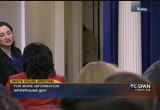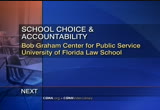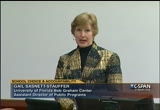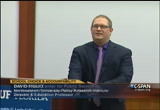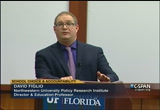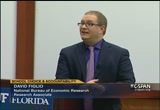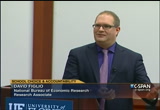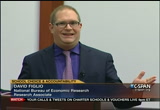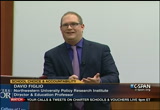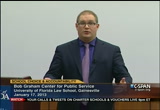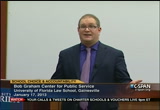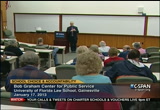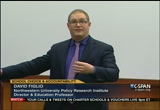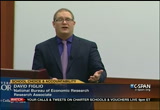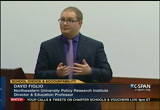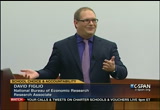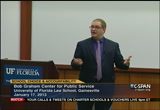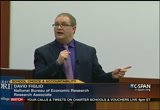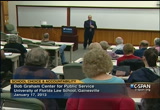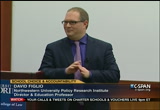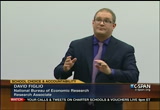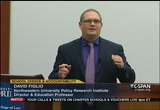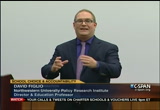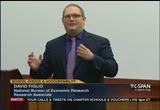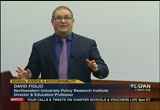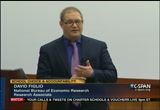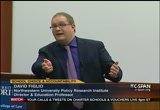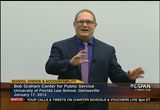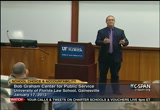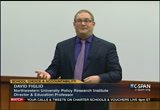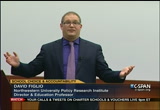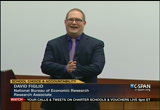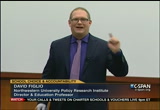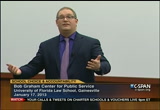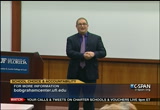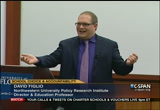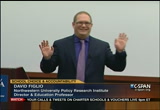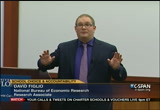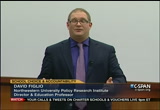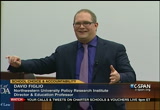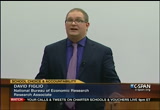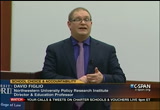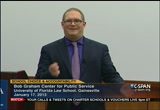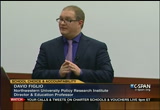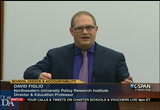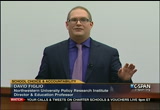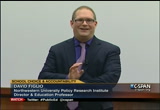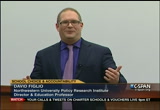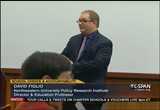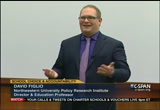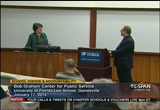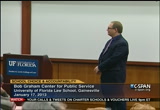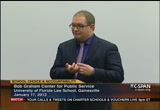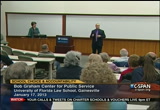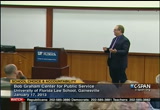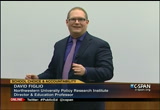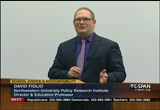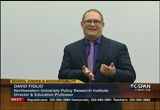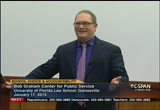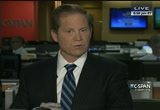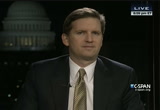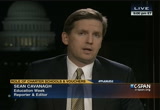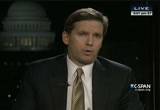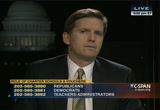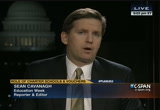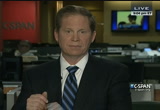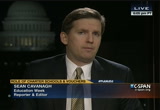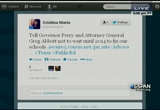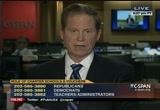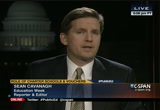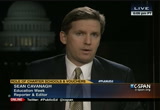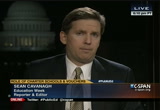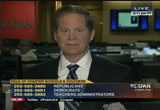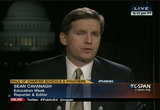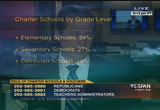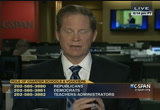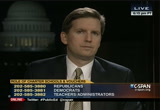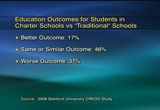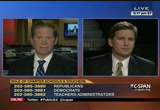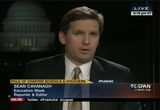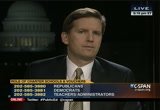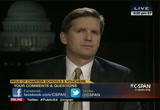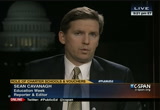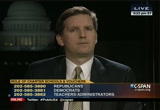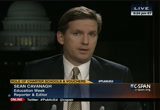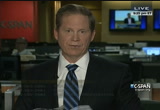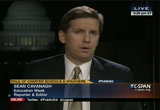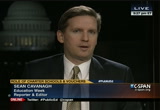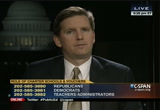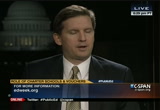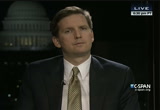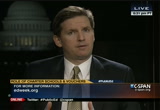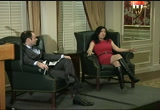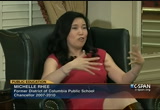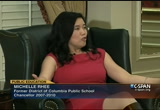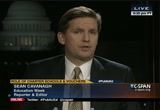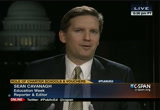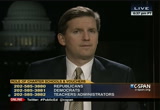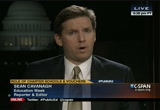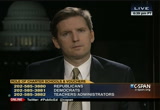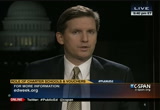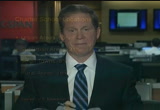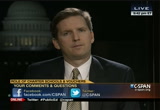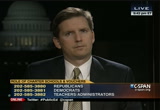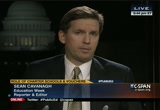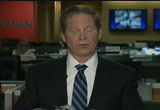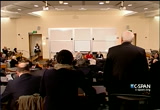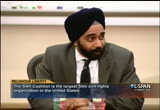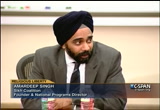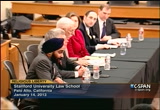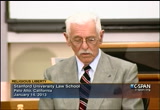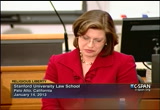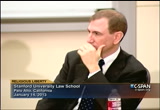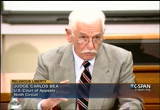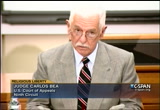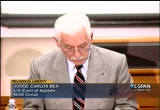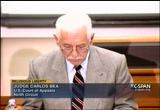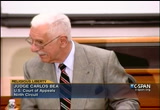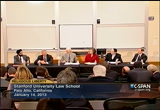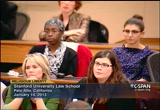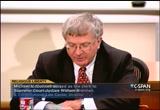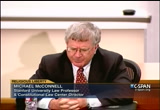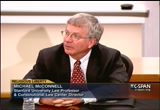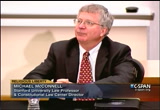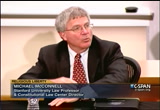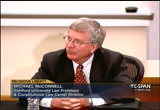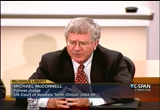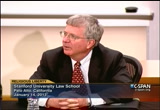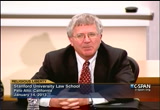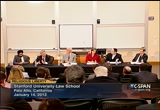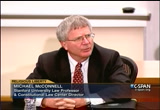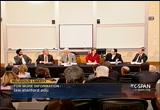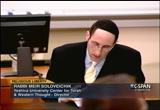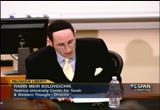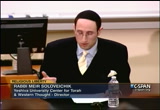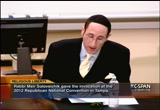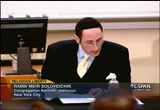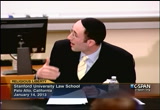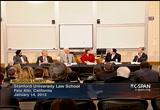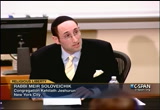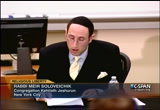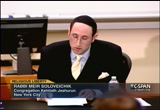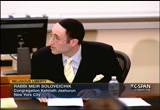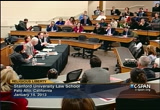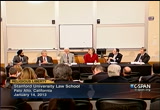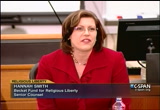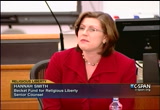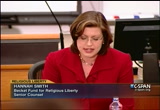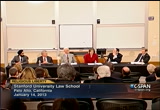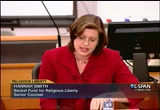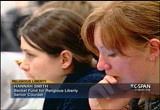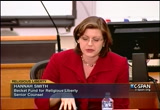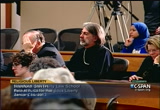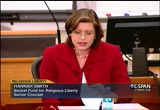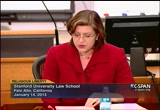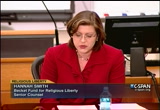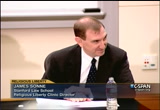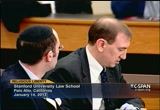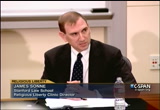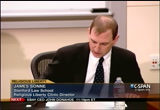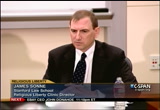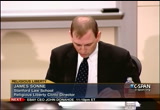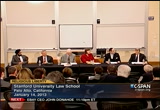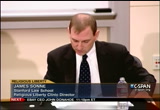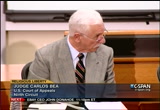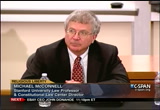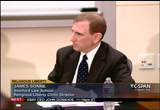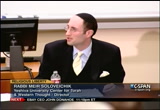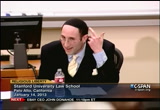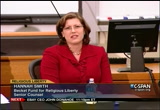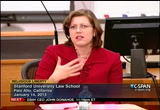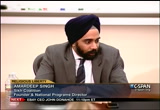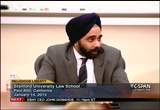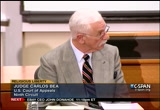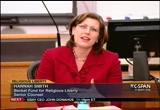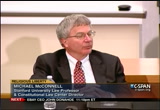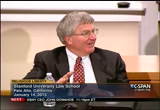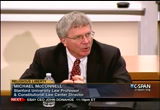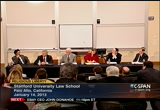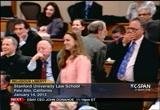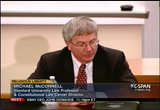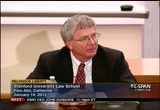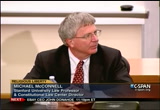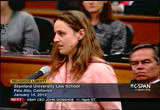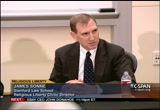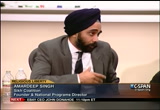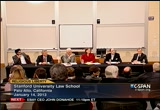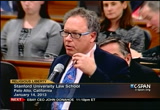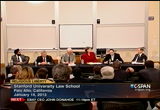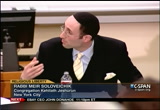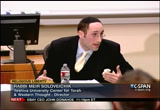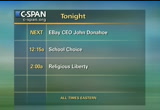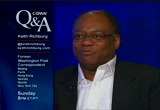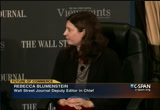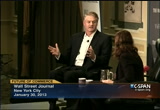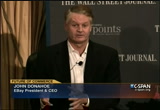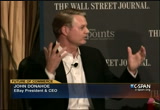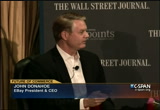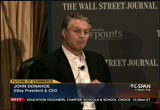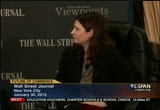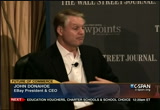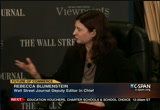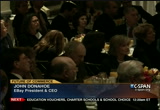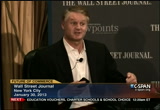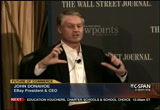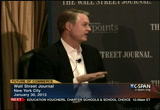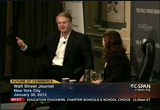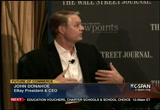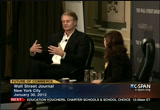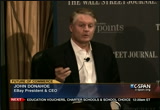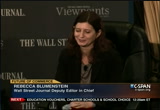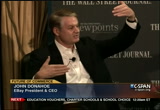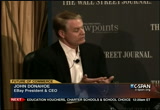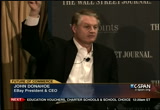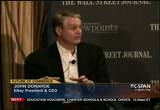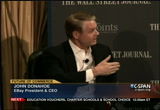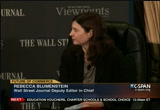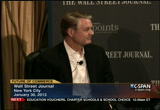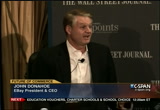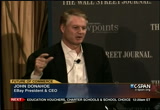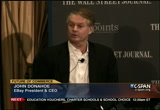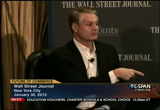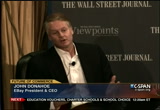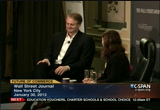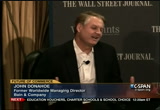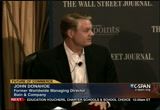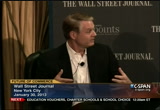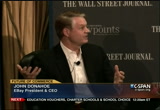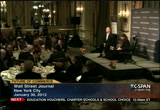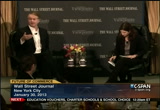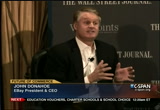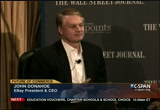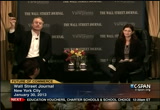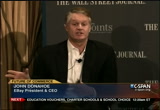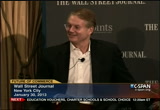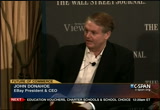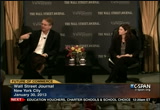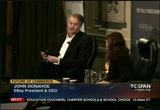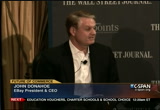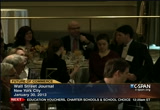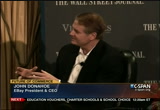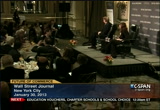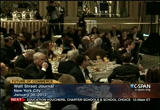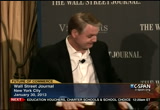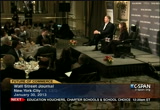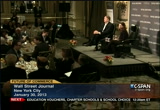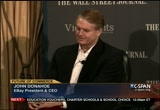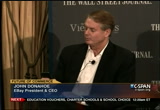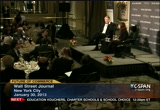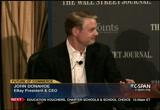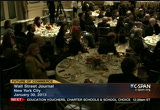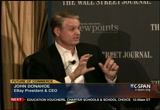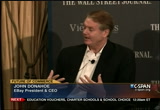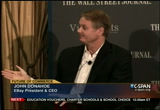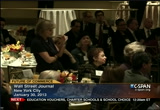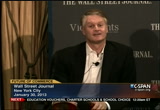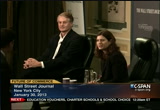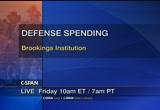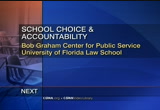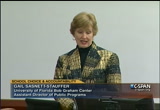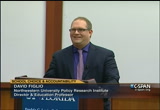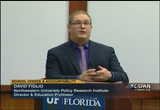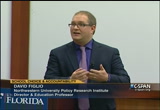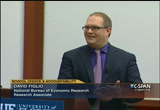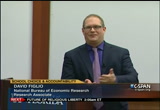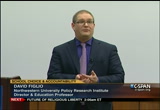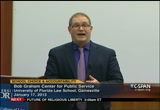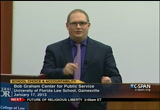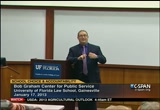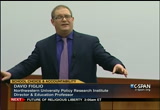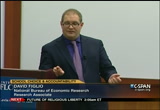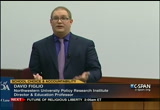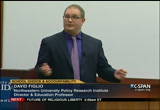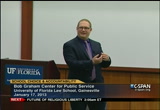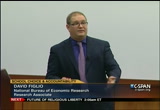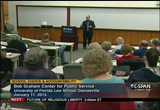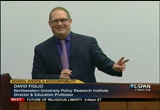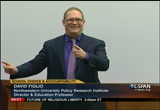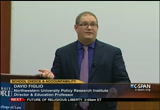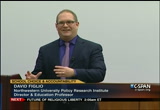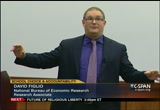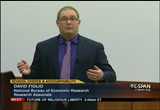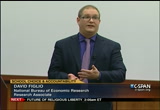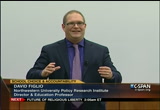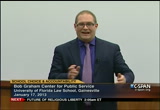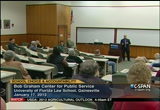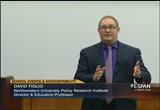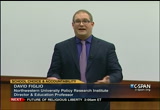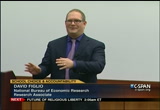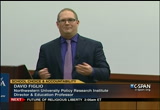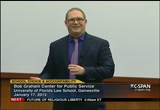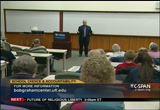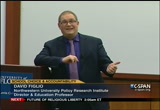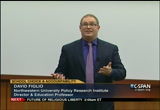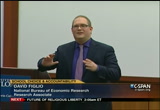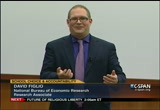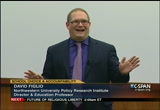tv Capitol Hill Hearings CSPAN February 21, 2013 8:00pm-1:00am EST
8:00 pm
[captions copyright national cable satellite corp. 2013] >> tonight, we will be talking to education week reporter sean cavanaugh, who covers charter schools. we will want to hear from you. you can call or e-mail us. we also want to hear from you on twitter. in january, a northwestern university professor david figlio talked about school choice at the university of florida law school. this is an hourlong event.
8:01 pm
>> thank you. the bob graham's center for public service is very pleased to co-sponsor this. this is a great policy for us to look at. david figlio is the professor of education, social policy and economics at northwestern university. he is also a research associate at the national bureau of economic research and a founding member of the research program on the economics of education. his research on education and social policy has been funded by the u.s. department of education, the nih and the gates foundation among many others. his current research involves evaluating the tax credit scholarship program, the largest
8:02 pm
school voucher program in the united states. conducting a large-scale study of school accountability in florida and following children from birth through school career to study keep questions regarding early childhood poverty analysts inequality. prior to joining the faculty at northwestern in 2008, david figlio taught at the university of florida from 1998-2008, and the university of oregon from 1995-1998. help me welcome david, please. [applause] >> thank you all for coming out tonight. it is a real pleasure to be year of the university of florida. as gail mentioned, i spent 10 years on the faculty here and
8:03 pm
still am always thinking about reasons to come back here. it is fabulous to look out of the audience tonight and see not only colleagues from the university but friends from the community who i grew to know and love over the years. so, it is especially wonderful to be back here in gainesville for this event. so, i was urged to start on time and and on time, so let me tell you briefly an outline of what i am going to try to do over the next 35 minutes or so so that there is time for q&a toward the end. i would like to start out just by laying a little bit of the groundwork for the trends in american education policy of the last several decades. i went to then give you a bit of
8:04 pm
understanding of some of the reasons why people have been proponents of some of these policy changes. i will talk a bit about some of the reasons why these policy changes may work the way people are hoping, and why they may not work the way people were hoping they would, and then move into a discussion of some of the evidence today regarding whether or not these policies have been having the desired outcome as well as what might have been some of the other outcomes that people might not fully have thought through. i know this audience has a wide range of knowledge about the state of american education policy today. one of the things i think is pretty remarkable, in fact, there were a group of us talking prior to this and one question
8:05 pm
asked of me was is there really any different anymore between what the democrats and republicans even think about education reform? i can see why some people might wonder about that. if we think about the "race to the top"program that president obama is doing, it involves an increased emphasis on testing students, tying teacher evaluations to those tests, and suggests that there should be some reward or sanctions met it out to teachers on the basis of this testing. that was coming from a democratic president. how different is that from what preceded president obama with george w. bush? the answer is george w. bush
8:06 pm
never could have done that because he was a republican, so in some regards it required democratic president to push forward an agenda that some people might have associated with republicans. i can see why people are thinking what is the difference anymore between the various education policy agendas of various people. it is useful to think about how different the landscape is today in education policy versus what it was only a decade or two ago. if you think about american education certain 1980 or even circa 1990, we saw the overwhelming majority -- 97% of the population attending neighborhood public schools. i mean, amongst the people who
8:07 pm
were in public schools, that is, attending neighborhood public schools, schools there were associated with a given residential neighborhood. a small number of choice programs were invariably within the public choice system. we have had magnet school since the 1970's, but they tended to be relatively small and part of a general troy's infrastructure. different school systems would -- general choice infrastructure. different school systems would offer people a choice of a school other than the one they were zoned for, but generally, people had to jump through hoops to exercise that option if it existed at all. let's compare that to today. today, nearly every state in the union has charter schools.
8:08 pm
charter schools, for those who don't know, our schools that -- i would call them quasi--public. they are publicly funded schools that are free from some of the rules and regulations that traditional public schools are subject to. charter schools vary from state to state in terms of how they come to be. in some states, the schools get to determine what schools exist and what schools don't. in other states, almost anybody can found a charterer if they can find an organizer and the governing body. it really varies. but one thing that is common among charter schools in the united states for example is that these are schools that are
8:09 pm
operating with 1 foot in the public system. that is, they are usually subject to some nature of the same accountability standards the traditional public schools are subject to, but on the other hand, they also are more able, for example, to set alternative selection criteria for who gets to go to those schools. they can choose different curriculum. they can impose standards on parents, for example requiring that parents participate in certain ways within the school. so common nowadays we are seeing a fraction of students in the not -- so, nowadays we are seeing a fraction of students in the united states attending these charter schools. some school districts, such as new orleans, have become entire
8:10 pm
charter school districts. there is no such thing as a neighborhood public schools at all in the new orleans district. every school there is a charter school. other districts, like washington, d.c., more than half of the students attending public school are attending these charter schools. that was not the case even a decade ago. another thing we are observing occurring throughout the country right now is the introduction of public funding for private schools through what people often call school vouchers. some people prefer instead to call them scholarships. i'm going to call them dodgers tonight. the notion behind this -- i am going to call them vouchers to night. this is thatehind sess
8:11 pm
people can take public funding to some degree to a private school and then the schools no longer have funding for that individual student. one school voucher system in the united states is a scholarship program where students who have certain sets of exception malady -- exceptionality such as autism, a physical limitations or a variety of others, if their family states that they are dissatisfied with the level of education provided within the traditional public sector, they can take the amount the state of florida would have been spending on them (the public sector annan -- spending on them in the public sector and
8:12 pm
give it to a private school. the other program is called the florida tax credit scholarship program. that is aimed at students who are of limited family income. in order to qualify for the florida tax credit scholarship program, you have to have family income less than 185% of the poverty line. that is the same level of income you need to qualify for free or reduced price lunches in the public schools. to give you a sense of what that is, it is around $40,000 for a family of four. these are working class, lower- middle income families, for example, who are qualifying for this program. this program right now limits the number of these scholarships or vouchers to raise certain number of students, so it is
8:13 pm
first come-first serve in the program. but families can use these vouchers at any private school of their choosing, so long as it meets certain criteria, has been accredited, has been around for at least a couple of years and is financially solvent. so, there are relatively small levels of restrictions as stupid what can be used. -- restrictions as to what can be used. students can go to religious or non-religious schools under these programs. because the tax credit program is limited in size, unlike the program for disabled students, the tax credit program is limited to about $3,500-$4,500. it is slowly creeping up.
8:14 pm
private schools often cost five times that amount. as a consequence, close to 88% of students on the program are attending religious private schools. florida is not alone in that regard. a florida-style program has been implemented in a number of states from indiana to louisiana to pennsylvania. north and south, east and west, such that the "wall street journal" called 2011 "the year of school choice." 2012 had even more school choice programs being implemented around the country than 2011.
8:15 pm
at this point, we are serving a dramatically altered student landscape. that is a preamble into the type of world in which we are living now. you may want to ask yourself, why are we doing this? why might we have moved from a choice environment where students had -- and families had very little choice. the choice was essentially limited to their residence location to a system in which in many states, many families have the opportunity to attend private school using public money. those who are not going to private schools, many are going to charter schools, these quasi- public schools. even with in public schools, even within the traditional public schools sector, you are seeing dramatically increased rates of what we call open enrollment policies, that his
8:16 pm
policies that allow students to live in one part of town to go to school in another part of town. why are we seeing that? i would like to link it to another change in policy over the last 20 years, which is the so-called accountability movement. the school accountability movement, here in florida a it is called the a plus plan. for those who are not in florida, and nearly every state now has some way of evaluating schools based on student test scores and schools are ranked. in the case of florida, schools are rated a-f based on criteria, the fraction of students being proficient under fcap. they are also evaluated on the
8:17 pm
basis of student gains from one year to the next on those test scores, and they are evaluated on a few other things. for example, high schools are evaluated according to things such as graduation rates and the like. but largely, around the country and here in florida, schools are evaluated primarily on either the fraction of kids who need some performance threshold for the gains from one year to the next, or largely, in the case of florida, a combination of the two. ok, so, why do we have these things? i put these two things together, school choice and school accountability, to something i will call market based performance. i am an economist. a lot of the impetus behind these types of school reforms
8:18 pm
have been driven often -- many of the education reformers have been motivated by some of the theoretical work that came out of economics over the last few decades. it is useful for people to think a little bit about, what were some of the arguments? and that is the way for us to move into quickly assessing those arguments. so, why might we want to have increased school choice? well, economists like to think about evaluating various states of the world and policy according to two criteria, equity and efficiency. i think it is useful to start by talking about the efficiency question. i promise i am not going to spend much time on jargon, so bear with me. let me just define efficiency for a moment.
8:19 pm
often when people think about the word efficient, they think how many widgets can be produced using certain technology, right? i want to use a more expansive definition of efficiency that economists like to think about. let's think of the efficiency for the sake of our question tonight as -- think about the quality dimensions. better means more in efficient. worse means less efficient. we can define better anyway we want, and that is ok from the point of view of this discussion. keep in mind, whatever you think means a better school, that means more efficient. within the notion of efficiency, there are two different types of efficiency. this is the last jargon. we have production efficiency and allocated efficiency. there is no test.
8:20 pm
all right. in the case of productive efficiency, when we talk about a school be more productively efficient, what that means in english is that the school is doing a better job using their available resources. when we think about allocated efficiency, that is the idea that individual students are well matched to different schooling environments. so why might school choice -- again, we are at the stage where i will describe the rationales, and then i will describe the other side -- and why my school choice be to increase productive efficiency? one argument made is -- and this is a popular argument among
8:21 pm
free-market economists like milton friedman. if a school faces no competition, if a school knows they are going to get the same from the of money government regardless of if they are doing a good job or a bad job, if families do not have an out or an easy out from that school, they may be less likely to try to innovate or do a good job. that is of very pessimistic view of the world. it is basically suggesting that educators are only interested in revenue maximization and not interested in educating, per se, but you know, you can tweak that however you want. educators here about two things. they care about making their
8:22 pm
jobs as epoxy -- educators care about two things, making their job as easy as possible and educating kids as well as possible. making the job easier may win out if they do not have to compete. proponents of this a of say if we make educators -- proponents of the essence argument say that if we make educators compete for students, they will work harder to do a good job. the other argument says that every student learns better in a different environment. so, if we provide families with more choice, maybe families might select one school -- if they are presented with a wide range of schooling options, they
8:23 pm
may select one school for one kid and another school for another kid. if we provide them with those choices, maybe it is not that these cooling will get better, per se, but kids will be -- the schooling will get better, per se, but the kids will be better matched to their school environment. the argument for school choice is the notion that in some us in thisany of the so room have always had school choice. and that is, we could choose where to live. 20 or 30 years ago, if you were not happy with the school you were zoned for, you could move to another place. relatively affluent families have that opportunity. if we did not like the public schools, there were private school options we could pay for.
8:24 pm
we had all sorts of opportunities. but may be poorer families were students of color who were maybe in neighborhoods that had been redlined over the years so that they could not live in other neighborhoods, maybe those families had fortresses. if you were poor, maybe you could -- maybe two families had fewer choices. if you were poor, maybe you could not go to private school. the equity argument was a strong one. if we look back at who were the bedfellows at the dawn of the modern school choice movement in the 1980's and early 1990's, it was a combination of free-market conservatives and often advocates for low-income and minority groups. for example, the urban league of florida has been a longstanding supporter of increase school choice option.
8:25 pm
it was often because you had allies -- people focused on the efficiency side becoming allies with people on the equity side. they were in favor of increased school choice options. now it is important to take a step back and think about why some of these things might not work so well, might not work as well as we might think. ok. so, i think -- i am very much a moderate politically when it comes to these things. my view is there are very few silver bullets out there, if any, in education. why might there be very few silver bullets out there? one possible reason is that if we think about the underlying economic model behind this --
8:26 pm
often people who are free market education at the kids will say things like well, the reason we want vouchers is the private school market is already being disciplined by the power of the market. so private schools do not need accountability because private schools live or die based on their quality. well, that assumes a very big assumption, right? let's think about what the assumptions are that would make that true. one thing that would make that true would be if there were full information. as a parent i knew exactly what went on in each and every school perfectly and could very clearly identify what was better and what was worse for my child, that could possibly help to move us in that
8:27 pm
direction. but i don't think there is anybody in this world who is omniscient like that. the underlying argument behind unimpeded market based choice assumes that is the case. another underlying assumption in there is that schools can just open and close like factories can. we know that is not true either. there is no place where somebody has a great idea, they open a school and they can immediately produce and that type of thing. there are all sorts of foods people have to go through, even in the and -- hoops people have to go through, even in the private market. so now we start to wonder, if parents have an idea but do not really know which school might be better for their kids, then
8:28 pm
the more you move away from this notion that parents really have a good idea, the more you have to wonder if we are really going to see the gains in allocative efficiency that are really going on. likewise, the more people may be moving based on noise as opposed to reality, changing schools for example, the more we wonder whether schools really face much of an incentive to compete for students. if you are an educator and you know parents are going to randomly decide to leave no matter what you do, even if you ifught into the notion depthat i work harder or work differently, that will make my school better, why would you be responsive to that if somebody is flipping a coin to decide whether to stay or go?
8:29 pm
i may be being a little dramatic on the other side, but the point is there are the strong assumptions that people sometimes conveniently forget when they talk about market- based solutions to an education problem. let's talk about school accountability for a moment. in the case of school accountability, here, the primary argument behind the school accountability movement is something -- ok, i lied. one more piece of jargon. there is something called the principal agent problem. it works as follows. suppose that we as society are interesting educators to act on our behalf, but of course, educators know more about what is going on inside their classrooms than other members of society. the argument might then be dead educators might prioritize
8:30 pm
things that we as -- beat that educators might prioritize things that we as a society do not necessarily care about. so the argument is that we can force them to do the things we want them to do. here is one piece of evidence that is unimpeachable. it is true in florida. it has been true throughout the country. it is true everywhere in the world where school accountability has been instituted, and that is, educators are really good at doing the things they get measured on. it is not just educators, right? it is all of us. if you were told in your job that you have two types of things you have to do and your paycheck is going to be determined entirely on one type
8:31 pm
and not at all on the other type, you are probably going to focus more of your energy on that, so there is nothing special about educators in that, it is just that educators are the topic of tonight's discussion. people are -- so, for a long time in the florida department of education there was a sign that said, "what gets measured is what gets done." that could reflect everything good and everything bad about the school accountability program. let's talk about the bad first. suppose that we as a society care about two things. i am being overly simplistic. let's imagine those two things are the ability for kids to do algebra quickly and the ability to think critically in broad and
8:32 pm
more inquiry-based measures. suppose we have a test that is really good at measuring kid's ability to do algebra quickly, the not at all measuring tw ability to do inquiry well. one result would be that educators might focus more of their attention on teaching the things that are on the test. -- quickebra' algebra skills, to the detriment of some of these other skills we might really care about. the plus side is, suppose the things on the test really represent the things we value in society for the vast majority of students. to the degree to which that is true, there is a positive side. we know what has happened. there have been hundreds of
8:33 pm
studies to show us what has happened. but now there are other things educators have done that you may wonder more if this is a positive or negative thing about school accountability. teaching to the test in many circles has a pejorative connotation. reasonable people might say teaching to the test is good and others might say it is terrible. both can be true for different reasons. but there are other things people do that could be less positive. i will mention two examples of research i have done in different places, one here in florida and one in virginia. in florida, at the dawn of school accountability, one thing i discovered was that, of
8:34 pm
course, who got tested? the students in school on testing day. that made me wonder if schools might be influencing who was there on testing day. i found out that after the tests became high stakes, schools were really throwing the book at low achieving kids if it happened to be that they would be suspended during the testing period. highest achieving kids could get away with anything and they would be there on testate. -- test day. it is hard to tell a positive educational story for that, right? i have fought for years about it and i have a hard time imagining a positive story about it.
8:35 pm
i talked about florida being an industry leader in terms of school choice programs. virginia was an industry leader in testing. anybody in florida who thinks florida kids are tested a lot, just look north to virginia. virginia has tested in more subjects for longer. in virginia, a lot of the testing takes place in the afternoon. that may be wonder, maybe schools might want to affect lunches in the way that athletes carbo load before the race. and it turned out they did. i am not talking about the obesity problem. i have seen headlines saying "testing is making us thafat." that is not the case.
8:36 pm
but you can look at tests administered in the afternoon vs tests administered in the morning. students were doing better on tests administered in the afternoon when schools have the opportunity to directly influence their minds. by the way, if you are interested in knowing what causes a short-term brain boost, give yourself a dose of glucose, like apple juice. but you do not want too much like a brownie, because that slows the absorption of the glucose. low-fat, high cards. that type of thing actually really helps. schools are doing that like crazy. they were doing a meal equivalent of that.
8:37 pm
so what does that mean? a lot of people misinterpret those types of findings, but one important thing for you to take away from that type of finding is that it is possible to manipulate test scores. if schools can raise their rates by 6% just by dosing their kids before a test, it says something about how much we should pay attention to these scores. let's think about one of the things we could learn about the design of the school accountability system. i will talk briefly about school choice and then leave this open for 10-15 minutes for questions. one thing we can take away from this is that -- how do we want to try to maximize positive educational benefits and minimize the chances that schools are going to be i
8:38 pm
suspending misbehaving low achieving kids for 10 days to keep them from taking a test or to carbo load the kids in order to give them an artificial brain this? one thing we can do is what florida did in 2002. that is, change the rules of the game so that schools are now judged not just on fraction of kids who get over a line, but a fraction of kids who are improving from year to year. that is a little bit of the simplification, but i can expand on that if you like during questions. suppose you want to carbo load kids' lunches. now you're artificially boosting scores this year. that means next year you have to do even more. kind of like kids who get caught in a lie, right? you get caught in a lie and now
8:39 pm
you have to make up even more to get out of that lie and that a few even deeper and deeper. ultimately, what happened in florida -- i did not to the neil study here, but i did the disciplines study here. as soon as florida changed its rules, the discipline thing went away. florida is one of only a handful of states that have rules that make it less attractive to engage in that type of behavior. so, as a what you want about school accountability in florida, of whether it is positive or negative, and i think there are both associated with it, but florida has more of the positives and fear of the negatives than louisiana, california, massachusetts, and many other states in the country because of the rule changes that
8:40 pm
have taken place. with regard to school choice, what is the answer? well, we are still learning a lot about school choice, but i will mention that school choice is no where close to the silver bullet that i think advocates were hoping for. likewise, i also think it is nowhere close to the problem that opponents are fearing. i have done a lot of research on the florida tax credit scholarship program. remember, that is the voucher program that was providing scholarships to go to private school for relatively low income kids. what have we learned about this? the first thing we are learning is that -- who are the kids that use this? they are not just any low-income kids. they tend to be the kids who are performing the worst in their
8:41 pm
traditional public schools. it looks like that is a little bit of an argument in favor of mismatch. maybe some kids were doing very poorly and parents were trying to find some alternative option for them. whether or not they are succeeding is an open question. the second thing we have learned about this in florida is that kids who were participating in the voucher program are doing no better or no worse on average than they would have done had they stayed in the public school, to the extent we are able to tell. there are a few statistics involved there, more tricky than i would like. but generally, they are doing no better, no worse on average than they would have been a public school. people can interpret that positively or negatively. people who interpreted negatively say, well, if they are not doing any better, why are we taking them out of a
8:42 pm
public school to be in a private school where they are not doing any better? the positive people say maybe they are doing better in things that we cannot measure. if we could, i would be measuring it. i do know families are happy with their choices. every one of us is always happy with our choices, right? not to school, but everything else. are you happy with the car you paid $30,000 for? and even if you kind of think it sucks, you passionately love that car, right? and so on. that is something there could be viewed either positively or negatively. the third thing -- and this is something i view as a positive, and it kind of surprised me a little bit, is that it does turn out the public schools seem to be doing a little bit better as a direct consequence of having this competition from the
8:43 pm
private schools. now, a little bit is the operative word, because that has been misinterpreted too. some people say public schools are doing better, therefore, it is a definite slam dunk. it is positive. it is consistent. but it is modest. marginal schools seem to be improving a bit as a consequence, at least along a certain set of observable lines. so, where do i come down on the florida tax credit scholarship program, at least as it currently stands, of which is a relatively small program? my view is moderately favorable. i mean, there are some issues, but there are also some positive benefits. but one other thing we see here is that there are a lot of
8:44 pm
outstanding private schools and a lot of really horrible private schools participating in this program. what we see happen, and what i think it is important that we see happen, if you are excepting public money, there should be a high level of accountability. i think what we still see in florida and other states is a little bit of a double standard. public schools need all this accountability and measurements, but private schools do not need as much because they are disciplined by the market. i do not think that is really true. if it were, how would that explain the truly, desperately terrible private schools that exist? now, for every truly desperately
8:45 pm
terrible private school, there must be an exceptionally good private school too, or the average would not be the same as the public schools. if we are going to have publicly funded private schools, we need to get rid of the delusion that somehow private schools are disciplined by the market. so, i hope i am leaving you with a little bit of confusion, because ultimately, i think there are no easy answers. if somebody were to tell me, what would you do as the education czar? boy, i would hate to have that job, because i think there are no easy answers. i will leave you with one thought and then take questions. the one thought is, you know, we should think a little bit about all the education reform that has been going on and ask ourselves, is it really helping
8:46 pm
our kids do better? i mean, it is helping along the lines measured on test scores, literacy skills, algebra skills, that type of thing. but we have to think a little bit about what is special about american education? and there are certain things that are special that are hard to measure on tests. now, i am part of the higher education sector, but it is true that american higher education is the best in the world. american k-12 has done a really good job of preparing a large fraction of our population higher education and at the world. and that was before accountability. so, we need to think about not
8:47 pm
only things that are easy to measure, but also things that are intangible, because we could cut off our nose to spite our face. so now i have confused you even more. thank you. [applause] >> we have a few questions, only a few loaded ones. the first one is i think a great question. how can we give a good teacher an incentive to teach at a low performing school? >> well, i think that there are a few different types of things that we can do. one thing, of course, would be by a compensation. if there are schools where we
8:48 pm
have a difficult time finding excellent teachers to teach at, i mean, i am a believer in a certain market and one market i strongly believe in is the labor market. if we are having difficulty staffing certain schools -- and it could be low performing schools, schools in a certain neighborhood, whatever. i am supportive of the notion of differentiated pay for people who teach in schools where it is hard to get teachers to teach. i don't see any other reason. i mean, and the other way to do that. the other choice besides compensation is to force people against their will to do things they do not really want to do. now, some school systems do that, right? and others do that only four new
8:49 pm
teachers. once you are experienced and have status, you can say now i want to go and teach at that school. so we can either force people to do something they don't want to do or we can make them want to do it. i am a believer in giving people reasons to want to do things. >> this one requires you to be a lawyer. opportunity scholarships in florida were declared unconstitutional, and those were scholarships given to children who were in love performing, failing schools. -- low-performing, failing schools. now, what is different about the corporate tax scholarship and the other scholarship that make s them constitutional?
8:50 pm
>> i am an economist. i am not going to touch that one. >> that is a question our committee is asking and we are hoping to get some legal opinions on that. the argument we have heard is that the corporate tax rebates are terrible contributions. we will see how that plays out. here is another one. you mentioned you are going to meet with tony bennett tomorrow. he is the new commissioner of education. he is a supporter of school choice. however, he believes it should not stand as is in that would ever school receives the money should still be held accountable, like public schools. how do you think this will change school choice in florida? >> well, i guess i have already gone on the record as saying i
8:51 pm
think schools who are receiving public money should receive similar types of accountability. i think commissioner bennett is definitely speaking my language when it comes to that, because we do see that there is -- that there are -- i mean, i kind of view this as a fairness issue. if we're going to be saying we want you public schools to compete with private schools, then first of all, parents should have a certain type of information so they can judge for themselves, at least along some similar metrics, what the differences are between them. and the big question becomes, how will it change? one possibility is private schools having to take the fcat.
8:52 pm
if you are participating in the florida tax credit scholarship program, you are required to administer an achievement test of your choice. for those of you who are veterans of public schools, up until a few years ago, that was called the fcat-nrt. but it does not have to be. it could be the iowa test of basic skills. ok, because of the question i will have to go into jargon again. some of these tests are evaluating a set of skills that have already been established. others are more formative. that is, they are intended to
8:53 pm
tell teachers more about where to focus. private schools are able to choose amongst these types of things. it is hard to make an apples to apples comparison. i have been forced to try my hardest to make those comparisons, but it is difficult and it is not uniform. i will say that commissioner bennett's ideas are not too dissimilar to what many people in the department of education and in the scholarship funding organizations come a step above for students, that administers the scholarship -- funding organization, step up for students, that administers the scholarship, has been discussing for years. my hope is that there could be a rule of law behind it that because many of the key players in private school choice in
8:54 pm
florida actually want to see that which i would like to see as well. but we have to have the laws to back it up. >> one more question. does more choice lower the quality of the non-choice school because of decreased funding to the school population? >> that is really hard. there are three of ways in which school choice can affect non- jury schools. i talked about two of them already a little bit. one is the competition. i told you that the available evidence suggests that providing school choice leads to small but positive degrees of competition. in that way, as school choice is helping. the second involves composition. who are the kids there? school choice can really go either way, because it all depends.
8:55 pm
some school choice programs might stimulate the best and the brightest kids to leave a given school. and there, often it is families that make a difference. especially schools serving populations with less family participation, that can be potentially devastating to a school. on the other hand, school choice could incentivize students who are performing poorly to leave the school. the composition, who stays, who goes, i can work both ways, and that is where you have to think very carefully about the nature of the school choice program. then we get to the resources. the resources side is a mixed bag as well. definitely at the level of the school system itself, if school systems are losing resources, we have to think about the
8:56 pm
resources that -- ok, one more bit of jargon, the marginal versus the average. what happens is the school systems are compensated by the state here in florida based on some measure of average. but you cannot just hire of the teacher, ray? you have to hire -- you cannot 19/20 of a teacher, right? you have to hire of a teacher. -- 20/20 of a teacher. it could be the case that individual schools might do better because of losing kids. in a lab to a county -- in
8:57 pm
alachua county, they now have class sizes of 16 instead of 19 because three kids from every class have chosen to go. they are probably not now going to combine those to make classes of 32 students. maybe they would in florida, i am not sure. but that school might be made better by losing a few kids if they get to keep the same teachers, because now the class size has gotten better. it can hurt individual schools. it could hurt or help, depending. so again, we close with confusion. >> david, thank you very much. >> my pleasure. [applause]
8:58 pm
[captioning performed by national captioning institute] [captions copyright national cable satellite corp. 2013] >> we heard david figlio, about school choice for the last hour or so. now it is your turn. we have opened up the phone lines to hear what your opinions are of school choice and school vouchers. here is how you can do that. s are open.ine on facebook, one of the questions we pose today is about school choice. there are a lot of responses and we will get to some of those in a moment. you can contact us on twitter,
8:59 pm
and we will get to those responses momentarily. first, let's take a look at what came in on facebook in the last couple of minutes. >> joining us to talk about this and to take your comments and questions is john kavanagh, a reporter and editor with "education week." thank you for being with us this
9:00 pm
9:01 pm
>> reports indicate that in 2000, there were some 300,000 students in charter school. 2013, the most recent figures, 2.3 million students. what is driving the bohème? >> a lot it has to do with policy. state legislators and governors have become more interested in the a charter schools and have formed policies allowing them to grow. in many cases, i think a lot of people would argue it is parents who want alternatives to traditional public schools in their states and their neighborhoods. it is a variety of factors. also, there is a more diverse market for charter schools than ever. you have charter schools that cater toward students who are
9:02 pm
struggling in school, charter schools that said very high academic expectations for students. the menu of options for parents is a pretty broad one right now. >> we are interested in our viewers experience. we have callers on the line. washington, d.c., go ahead. >> i have some experience with charter schools, and one thing i determine to be a predator to having a great experience as opposed to a lesser experienced is teachers are caught up in the dynamics of what they are actually trying to get done with
9:03 pm
any given school week and have the administrators change subject matter sometimes midstream. they are always trying to catch up. and was wondering if you had any ideas about when new administrators come to the school, their ability to be able to monitor teachers over a period of time. >> do you have a child in a d.c. charter? >>thank you for calling this evening. do you have an answer for him? >> good question. i think new administrators coming into a school and, if i understand the caller correctly, shaking things up or trying to put pressure on the teachers to increase student performance. that will be -- a principle
9:04 pm
comes in as the boss. they are the captain of the school. they will have a major say in shaping the policies of this school within the confines of what the school district says. and shaping the morrell, the expectations for teachers. -- the morale, the expectations for teachers. the circumstances he is describing are probably accurate. how they apply to other schools, as well. >> let's go to texas on our democrat line. welcome. >> [indiscernible] school choice.
9:05 pm
[indiscernible] >> repeat your question? i did not quite hear it. >> school testing. [indiscernible] public testing. compared with charter schools. do you have an explanation for that? >> thank you. i think it depends on the state, the district, and what circumstances you are in with public and charter schools. there is no one clear answer on that. charter and public schools are required for state tests. in one sense, especially now, a
9:06 pm
lot more testing data is given to parents than given to them, 10 or 20 years ago. parents have more options to compare the results for their neighborhood charter schools against traditional public schools in their neighborhood. we might get into this later. generally, the results are pretty mixed when you are trying to compare traditional public schools on the whole verses charter schools. you will get some studies that show more positive results for studies, but others show traditional public schools white -- winning out. aboute is a tweeti talking the issue of education in texas. -- governor rick perry in his state of the state address talked about charter schools. here is a bit of what he had to say. >> not every child learns for
9:07 pm
the same purpose or thrives in the same setting or schools. limiting a child to one opportunity does nothing more than limit that child's future. the way forward must involve more public charter schools, which will offer parents a tuition-free alternative to their neighborhood school. those innovative public schools already served more than 150,000 students across texas, with more than 100,000 on their waiting list. it is also time to introduce a scholarship programs that give students a choice, especially those who are locked into low .erforming schools kerr [applause] >> we are talking with sean cavanagh and talking to you on
9:08 pm
"education week" taking your calls. let's go to indiana. helen is on the line. welcome. >> my question is, this is only the second year in indiana they have had vouchers. i am sure the catholic schools receiving the vouchers are good schools. however, it is my understanding that is actually unconstitutional. is that constitutional? i have already asked you. >> thank you for your question. sean cavanagh, any answers? >> the short answer is it depends on the state. as the caller may or may not know, the crucial point is which
9:09 pm
vouchers are allowed to go what state wh constitutions say about vouchers. in many states, the state constitution forbids public funding for flowing to nonpublic schools or religious institutions. those features are also called blame amendments. what often happens is a voucher proposal will be put forward or make it into law and if the state constitution is very restrictive on public funding, it will be struck down. i believe the indiana voucher program has been the subject of a lengthy court case. it will be one of many going on
9:10 pm
and around the country. >> about a dozen states with voucher programs, including arizona, florida, georgia, louisiana, maine, mississippi, ohio, oklahoma, utah, vermont, wisconsin, and the nation's capital. what is behind the increasing popularity of vouchers? >> i would attribute the popularity of vouchers to a couple factors. that, 2010, wes ba saw a lot of republicans make a lot of gains in the state level, in legislatures and taking control of the majority of governors offices in the country. governors at that point controlled more state legislative seats than they had in the state -- pac
9:11 pm
what we saw after 2010 was a pretty significant growth in the passage of voucher plans across the country. that is one factor. backers of school vouchers because would say these programs have proven pretty popular at the state level and their communities among parents who feel that their children are and in economically struggling schools. >> we have set a number for teachers and administrators. arizona.to this is patricia on the line. >> how are you this evening? >> fine, thank you. >> good. my daughter, who is graduating from public school this year, went to a charter school for her first six years of education.
9:12 pm
it was a phenomenal opportunity for her to go. my son, on the other hand, we actually had to pay for it. i believe young people should have the opportunity to be in a structured education, a traditional education, or an optional education, religious or otherwise, and i am afraid the voucher system appeals to me if i had a child coming into the school system, i would definitely look at the catholic or christian schools as an option. >> thank you for your call. >> i think among people who support vouchers, you can hear some of the arguments put forward about what your caller was talking about, about what people -- about. people who support them say, parents are taxpayers, why
9:13 pm
should they not be allowed to use their portion of tax funding to send their children where they want? whether it is a public school, charter school, or to a private institution. when she talks about wanting to have that option, that is clearly one of the arguments put forward. on the flip side, what a lot of public school advocates say is a lot end up siphoning -- siphoning money from public school systems and that is not a way we will raise academic achievement on a large scale. >> over 54 -- 34% of charter schools are elementary schools. 27% our secondary schools. , schools, 19%. are they talking about a charter
9:14 pm
school that runs all the way from kindergarten to high school? >> probably. or, i would assume, a combination. part of the reason they are more likely to be elementary schools is many of them are trying to grow. they are trying to build from the ground up. they are trying to get a certain number of students and families involved and keep them on board and build from there. it is easier to do that, the thinking goes, it is easier to start small year after year than to try to serve everyone at once. that explains some of the numbers you are looking at. >> stacey, a republican caller, the evening. >> hello. >> you are on the air, go ahead. >> i agreed with what governor
9:15 pm
perry said, and i wonder why we have to make a choice between supporting public education and supporting a good education for the children. >> what is it like in california in terms of the access to charter schools and the use of vouchers? >> i do not know about the use of vouchers, but i have two boys. 10 of the best public elementary schools in the state, to a charter because the charter offered more in terms of academic growth at the level my children were at than the public school did. the public school offered to move the boys up a great, but that was all they could do. the charter school was able to test them and let them move ahead at their own pace. >> sean cavanagh, this is a good time to ask what the best evidence is when you compare a charter school to public schools
9:16 pm
across the country. tommy how they stack up. >> the research on this topic is mixed. you will hear me repeat that a bit. when you look at nationwide studies of charters, like one of the most recent and often cited once was done by researchers at stanford university about three years ago. it was a nationwide study looking at charter schools across 16 states. what they found was a 17% of charter schools were outperforming traditional public schools. a larger number, around 35%, 37%, or charter schools and the outperformed by traditional public schools. the rest or even.
9:17 pm
charter schools did not fare very well in that study. there have been other researchers that come to different conclusions. they will not define the study that will settle the question of which type of school is the best option for all students. >> on our teachers and administrators line, calling from maryland. what do you do in this school system? >> i work with students in third, fourth, and fifth grade. i instruct them in higher level thinking. >> is this the public school system? >> yes. >> thank you for joining the conversation. >> my question is, how do you go about finding a charter school,
9:18 pm
and have you seen an increase in test scores when students come out of a public school to a charter school? >> to the first question, it depends on the state you are in and the district, but most of the time there is a charter school -- a person whose job it is to approve or deny the creation of a charter school and then oversee it. there is a time of anywhere between two years and five years, where the charter school is allowed to operate and they come back up for renewal and seek to operate for another term. depending on the state you are in, you may go for a state entity, in some cases universities to act as authorizes. in some cases, local school
9:19 pm
districts. i am not sure about research on students switching from the traditional public sector to the charter school sector. i am not sure. >> to florida on our democrats line, this is sean joining us. go ahead in florida. are you there? i think we may have lost him. let's move to idaho. ed, you are calling on our other line. >> i am a teacher. >> welcome. >> thank you. what i see, from my own opinion here, is a three tier system coming to education. you have private, charter, and public schools. i do not see it so much as people trying to get their kids away, because it sounds like there are not definite figures
9:20 pm
that prove one way or another, but is it is more of a learning environment. the motivated parents and students are getting away from the environment of the failures, the habitual his problem, and a lot of the social issues that are involved with public schools. i think the wealthy are going to end up with their kids in private schools. the public schools will be less with failures, discipline, and my question is, when enough kids, and the money goes with the charter schools and spread so thin, what will happen with those leftover kids in the public schools? >> thank you for your call.
9:21 pm
>> that is an area that is receiving a lot of scrutiny right now. you have the super motivated parents who are closely following the child's academic progress. they want to make sure they are in the right kind of school, tailored to the kids' needs, so they move them to a charter school. they are schools for choice. one of the arguments out there is if you have got a lot of parents moving their students out of traditional public schools into charter schools, the regular schools are going to inevitably suffer. there are also a lot of concerns raised now about the extent to which charter schools might be expelling or suspending students at a higher rate than traditional public schools. this is an issue we examined in
9:22 pm
this week's issue of "education week." that question the caller raises about what the overall impact will be, especially given charter school growth, it is one no one seems to know the answer to. but it is on a lot of people's mines. >> a couple of facebook comments. you can weigh in on facebook and on twittered. --
9:23 pm
>> back to what we talked about a few moments ago. to hank in minnesota, democrat line. good evening. are you there? >> yes. thank you. i really see this as two main issues. one is the fact it is very unfair for a parent to have to pay property taxes and then, if they want to send their child to a private institution, they have to pay tuition at that institution. it is a double whammy to that parent. it is terribly unfair. the second issue is the fact that, if the public schools are not customer driven. they are run by elitists at the school board who dictate what the objective of education are. they are breaking with traditional values of this country. for example, they are promoting
9:24 pm
homosexuality as a way of life, for example. a lot of people do not like that. it is not customer driven. that is why people are leaving. if the schools would become customer driven, they would not have to worry about people leaving and going to a private institution. >> do you still have kids in the public school system? >> i do not. i had four of them in school. in those days, there were not as many issues as today. >> they do for weighing in. sean? >> the caller represents some of the folks who are clearly dissatisfied with public schools and one other options. sometimes, those options are homeschooling their kids. the number of home school students are -- has grown. sometimes, they choose private schools. one of the advantages of private
9:25 pm
schools is not only can parents focus on very specific things and conveying certain sorts of religious values or other issues, but they really get to do their own thing, free of many of the constraints on the traditional public schools, which have to serve everybody, and have to offer a full range of services to everybody. when you talk about private schools, you talk about a very different mission, and a very different way of going about that mission. >> about 20 more minutes with our guest, reporter and editor heck he carried you can read his reporting. i want to take a look at vouchers on a particular place.
9:26 pm
one of the biggest programs in the country, wisconsin governor scott walker saying he would like to expand that state's voucher program. in the city of milwaukee, they have involved 112 private schools in the program, nearly 5000 students. $6,500 per student. the total cost, i assume annual, 164 -- $154 million. >> it depends on how you look at it. milwaukee past its first voucher program in 1989. it served as a model for a lot of other state voucher programs across the country. it serves over 24,000 students. there was a study that came out
9:27 pm
a couple years ago by the state that found vouchers were performing at the same level as traditional public schools in milwaukee. a more recent study out of the university of arkansas showed positive results for students with vouchers. i believe the program has been shown to offer pretty strong results in terms of graduation rates, but the milwaukee voucher program has been held up as the model, and the opinions of it will break down exactly along the lines of a voucher programs all over. clearly, governor walker believes if parents are buying into this program and it is proving popular, it will prove popular in other school
9:28 pm
districts around wisconsin. we will see if the legislature is buying into that. >> here is one looking at the issue of parents. it says -- joe is on the line. do you work in the school system there? >> not here. another district. i am an assistant principal. the question i have for shawn is something, when you do your research, the hedge fund managers, a ton of money in the charter schools. that is the data i have seen. is that something you look into? >> there are well funded foundations and philanthropists
9:29 pm
who are investing in charter schools. that is true. one of the criticisms of charter schools is that they are, in many cases, receiving extra funding that traditional public schools cannot benefit from. the flip side of that, charter school advocates have been saying for years they are at a disadvantage when it comes to other funding. per student funding, the ability to pay for buildings, find facilities, so the financial argument in terms of who is better off is not that clear-cut. if the caller is talking about profit managers of charter schools, there are a pretty significant number of those
9:30 pm
around the country operating charter schools, and, in some cases, online charter schools. they have come under a lot of scrutiny and, judging by what is going on now, they probably can expect to come under more scrutiny. >> he will hear some comments in a moment from michelle rhee. first, jason. >> hello. i have a small comment to make. that is, if i do not see teachers losing tenure for not doing their jobs, i will pull all four of my children out of public schools. i am an involved parent. to sit there and say that's i am not involved is ludicrous.
9:31 pm
>> where would you put them? >> they will be going to a charter school. i have a lot of friends -- they are doing this grading thing on a curve and it is not fair. >> he said, if i understand correctly, he is taking his kids to a charter school. >> that is his plan. he has not done it yet. >> he seemed dissatisfied with the quality of teachers and how teachers are evaluated. one of the advantages charter school reporters site over traditional public schools is freedom in many cases from collective bargaining
9:32 pm
agreements, governing teachers, so schools have much more freedom when it comes to hiring and firing teachers, to scheduling them at certain times, much more flexibility on the whole personnel front. the issue the caller raises, as it relates to a charter school, one of the biggest areas of appeal is for charter schools. >> michelle rhee has written several books on education and has addressed the issue of school choice. she will be on " tv this week and. here is part of what she had to say. >> there are a lot of people who believe, let's have universal vouchers. i do not agree. only when itice, not fo
9:33 pm
results in better outcomes for kids. the voucher programs we support our programs are for low income kids who would otherwise be trapped. it can be worked out in terms of how much money the voucher should be, to be fair. what i find curious is the absolute aversion people have to the concept of vouchers in public education. there are two reasons. one is, if you do not believe in public dollars going to private institutions and companies, etc., you do not believe in pell grants. it is the same thing. when kids get pell grants, federal dollars go to carvel -- harvard, yale, with those grants. food stamps can be used and redeemed at any store in your
9:34 pm
neighborhood. medicare can also be used at not just public hospitals. the idea we just cannot do that in public education is an odd thing. people often make an argument when it comes to vouchers, making the argument, we should not take it out of the system but take the money and invest in failing schools to make them better. here is why i think that makes absolutely no sense. we do not use that logic in any but -- any other part of our lives. if you went to a dry cleaner down the street, for every 10, seven came back with a huge burn marks on them, what would you do? you would stop going. what if they said, you cannot stop giving us your business and money, because we need your money to be able to invest in new equipment and to train our
9:35 pm
employees and if you take your business away, we will not do that. if we are willing to take that much care with our laundry, should we not take at least that much care with our kids? >> what did you hear in the comments there, about school choice? she equated school choice and vouchers to tell grants college students use. >> i know i have heard her make similar arguments to me. she was talking about how she actually changed her view of vouchers when she was chancellor of the d.c. school system, and when she would encounter parents
9:36 pm
who wanted to get into a good traditional public school and there were not spaces. so what she realized is she thought it made sense to also have private school options available to those students. d.c. has a voucher system that has been in place established by congress for some time. i think part of what she is saying is there needs to be a menu of options within a school district, charters, some vouchers, traditional public schools, and they will compete with each other and lead to school improvement. at the same time, she sounds skeptical of the more universal type vouchers in which money
9:37 pm
will go to a student who wants to attend a private school in edit -- in every circumstance. she wants to target to low- income students, students in academically struggling schools, and that is really in keeping with the democrats who support vouchers, many of them upheavalit in a more limited fashion. >> let's get to more phone calls. talking about school choice. mississippi, welcome to the conversation. >> yes. i am a product of the public school system. i also served 20 years in the legislature. the county i live in, we have 33,000 residents. five public schools, we have got school.ed and a
9:38 pm
every school district is different and every state is different. the main problem is the teachers are overloaded with too many students in a class. there should not be more than 20 students in a class. that is the way i was raised her. if we could get back to that kind of system, the public fine.ls will work ought >> any thoughts? >> you look at the research and it is mixed as to whether lower class sizes will produce student achievement. there are folks who think that will not lead to a big academic pay off for students. i will tell you this. low class sizes are popular with
9:39 pm
parents. parents do not like to hear of the class size is increasing for their students. they want to know their children are having a lot of interaction face-to-face time with their teachers. the sentiments voiced by the collar are many -- shared by many public-school families. host: marc is next. he is calling on the republican line from st. petersburg, florida. caller: my question is related toward common core standards. what type of impact will occur to traditional schools, charter
9:40 pm
schools, and voucher programs? guest: traditional public schools are gearing up to give these common tests based on common standards, which have been adopted by 40 states. we have written that a lot of private schools are either considering or choosing to adopt a common course standards because they feel it makes sense to them. they feel the standards of sound. among -- are sound. among charter schools, they are going to be expected to go along with the new common standards, as well. as we have reported, there are
9:41 pm
charter school operators who are nervous about this, saying this may infringe on our tradition of independence and our ability to shape the curriculum in the way we want. others are saying, we are more agile, we are more efficient, we can finely tune our curriculum to meet the needs of these standards and do so in a way that is much more easily done than traditional public schools can. >> the department of education says 55% of the charter schools -- >> this is william. hello. who really would not be
9:42 pm
for vouchers, the cat -- besides the teacher unions? in new york city, the teaching unions seem to be very powerful. they almost prevent vouchers from happening, at least in this area. if the parents really want to have a choice, why not put the dollars in the parents' hands and let them decide which schools are best for their cheek -- children. and which are succeeding. the schools that are failing will fail. putting the dollars in the parents' hands and letting them decide. it is public responded critic funded regardless whether paren. >> your thoughts?
9:43 pm
caller: it is very interesting because to hear people when they speak about a failing school. what that means are the students who are there. when the people say, we will monitor schools that do well and they will succeed and the schools, which sounds neutral, when we are talking about young people in those schools failing. what i want to discuss is that charter schools do not have to abide by all of the teff and rules of public schools, yet, for statistical purposes, this is wrong. we are comparing them equally. say we do not have a true model because you cannot compare apples and oranges. >> i will let you go there.
9:44 pm
we talk about that a little bit. do you want to address some of her specific comments? guest: she raises a good point. if you listen to what a lot of people say about these comparisons between traditional public schools and charter schools, especially the national level, where you are comparing thousands of schools across states, sometimes, the studies can be quite revealing. what a lot of people have told me is, the kinds of lessons we should be seeking out are lessons on whether the different kinds of experiments chart -- charter schools are trying, because part of the reason they were created was so they can experiment in which traditional public schools cannot, and staff, and scheduling, and so on. perhaps part of what we need to
9:45 pm
be doing is looking at, what are the traits of the highly successful charter schools and how realistic is it to think traditional public schools, that make up the vast majority of public schools in this country, how realistic is it to think how they could actually replicate those practices? >> we will wrap up our phone conversation and thank all of our callers. the conversation continues online. also on twitter. i also want to thank our guest this evening, sean cavanagh, editor and reporter for "education week." you can read his reporting on line. thank you for joining us. guest: think you for having me. host: you can watch a real air of this program this evening at 12:15 pm eastern.
9:46 pm
coming up next, we will take you to a discussion on religious liberty that happened about a month ago. discussions include the manner of dress in public places, whether animal sacrifices are protected by religious freedom. [captioning performed by national captioning institute] [captions copyright national cable satellite corp. 2013] >> first of all, welcome to our panel here. more importantly, the inaugural event of the first law school clinic on religious liberty. i am not a judge, but if i was, i would have been banging my gavel, but we are here and we
9:47 pm
have started her, and let me say before i have an opportunity to introduce the panel come ahearn -- panel,, that it is a true pleasure to be here and a true honor to be present for this occasion just by way of personal anecdote, to get a sense of why what we are doing is so important here, my first was built on a dare. i had a thriving baseball card business going up, buying and selling them. i never got a summer job because i was making more money buying and selling baseball cards to my little friends. when i was about 15, a work colleague of my father said, you will never ever get a job at mcdonald's because of your turn
9:48 pm
unheard -- turban. i said, you are wrong. i can get a job at mcdonald's. based on a dare, i give up my lucrative baseball business and work for mcdonald's. low and behold, two weeks later, i was indeed fired. it was not for the reason you might think or that we feared. what happened was during a low in the afternoon shift, i had a big mac sauce fight with one of my co-workers. and i was fired. [laughter] that said, the concern my community had with regards to the interception of the expression of their faith in the public square, are very real issues. the very real issues here in the united states today that still exist and having this law
9:49 pm
school in a wonderful marriage with the fund, the gold standard meets the gold standard, and they had a baby called the religious liberty clinic with jim over there, it is quite a marriage and bodes well. i welcome you here. i am very honored to be here. let me introduce the panel and we will hand it off. immediately to my left is a name everyone knows. is there for's bio you. i will not read from it. i am all struck as a law student. a long time ago, i did read his articles. mine was on religious liberty, a legal clinic we had to take to
9:50 pm
graduate and write a paper. at the time, the act was still more than the federal government. i wrote my paper about that and read some of his comments on it. it is a pleasure sitting on the panel of someone i read when i was in law school. the second to my left is the judge. i will not read his bio but it is very inspirational to know he is in a position he is in now. speaks to the strength of our country that we can incorporate and elevate americans of any background and make them a part of the decision makers in our society. two to my left is hanna's smith. i will say this. i read her bio. let me say this about this clinic and the work with religious liberty.
9:51 pm
i am a sikh who happens to be liberal. let me say this. in this work, there are many issues -- and it is not like this in the rest of washington -- that progressives and conservatives agree on. there are many issues. the beauty of the marriage between my organization and the fund is we found those intersections and we worked hard together. having hannah and being able to work with someone like her is part of the work with the fund speaks to the strength of people being able to find ways they agree, taking religious liberty and lifting all of our boats by fighting for one community.
9:52 pm
more to my left a rabbi. i will say this. i had a chance to read his indication he gave at the republican national convention. if you have not had a chance, it is not in the bio, but it is worth looking up. it speaks to values of liberty that impacts us all. it is quite inspirational. finally, all the way at the end is the proud papa and proud mama. our hopes are with him and his leadership of the clinic. i am so happy he is here. i will hand it off to the judge. >> thank you very much.
9:53 pm
i am very happy and honored to be here to inaugurate the religious liberty clinic with a distinguished panel of knowledgeable speakers. the clinic in this area is needed to clarify through litigation. at least one area of religious questions and the display of religious subjects in the public area, the public square. a year ago, justice thomas highlighted the apparently confused state of supreme court jurisprudence in this area and the denial of the utah highway patrol association vs. american atheists. he wanted the court to grant to clear up as far as the crosses placed along utah highways to commemorate fallen troopers, whether the lemon test should
9:54 pm
apply to religious displays in public areas. he said, since the inception of the endorsement test, we have learned a nativity scene displayed on government property violates the establishment clause. except when it does not. he was referring to the nativity scene unconstitutionally placed in the courthouse that was an issue in the aclu case. it constitutionally placed in the rhode island park. he went on to say they display the 10 commandments on government property and that also violates the establishement clause except when it does not. a text was hung in the courthouse in mccrery, and it
9:55 pm
was unconstitutionally. and a slab place in the public park was constitutional. finally, he said, a cross displayed on government property violates the establishment clause held here in utah, is that -- except when it does not. the cross is on county seals and buildings and they were unconstitutional. a cross sculpture outside the crossesomplex and ural on the school wall was constitutional. there was hope on the cross issue that it might be cleared up in a case that involved an 8 foot tall cross in the middle of the federal park.
9:56 pm
until the land was sold to a veterans' organization. a cross by the side of a public highway marking the place where a state trooper perished was said to need not be taken as governmental support for beliefs. the case was remanded for further rate -- further proceedings. i commiserate with justice thomas that the utah highway case was for a totally different reason. on like justice thomas, i was able to see quite clearly the reason why apparently conflicting decisions were reached in the 10th amendment and cross cases. i am surprised the line drawn in those cases has not been commented on.
9:57 pm
it is all quite simple if you just pay attention to the facts. the prohibited need to be seen was in the courthouse. in the other, it was in the park. the 10 commandments, it was in the county courthouse, and that it was in the park. crosses, they were inside county courthouses, while the others were outside. this led to a bright line of authority which lawyers could toise clients and judge its decide cases. if it were constitutional. [laughter] under a roof, it was unconstitutional. thank goodness the role is not completely abandoned by the courts.
9:58 pm
we are told it is not a decision of merits and does not create precedents. i am here to urge the religious liberty clinic to litigate to a clear determination, does the rule still stand? [laughter] i will now call upon each of the panel members in the order in which they were introduced and i will speak for a proxy -- approximately 10 minutes. then we will open up, if we have time, to the rest of the people here to ask questions. professor. >> a thank you. one of the most revealing an inspirational moment around the founding occurred in philadelphia in celebration of
9:59 pm
the ratification of the constitution. the city decided to hold a great public festival in honor of the ratification. there was, of course, food involved. so they had tables of food to ease the occasion. among the tables of food at the public celebration was a table of food appropriate for the jewish residents of philadelphia, a table of kosher food. i think this event is emblematic of something that was different in the united states from any other previous nation. we were not the first place to have some kind of religious freedom, but this public
10:00 pm
celebration in philadelphia shows what kind of religious freedom was going to be enjoyed in the united states. first of all, it is one based upon principles of inclusion. it is welcoming. it is not mere toleration. it is not that we have some officially dominant group, although, demographically, there was a dominant group. not officially and not publicly. the others are not just tolerated but are welcome, are fully part of the event, and secondly, this is in public. there have been regimes in which the freedom of religion is
10:01 pm
understood to be a completely private matter. in the statement by mendelssohn, in connection with france, he said to be a citizen in the streets but a jew at home, but that is not the message you get from the stable of kosher food in philadelphia. it is ok to be a jew in public, too. it is not a matter of expressing to the private. the spirit of freedom is perhaps unique to the united states in the world, but even
10:02 pm
here, even with that kind of sounding, and even with the words of the first amendment to express that, things have not always been so happy, and especially not always so happy for minorities in america. he was not then chief justice but the man who was going to become chief justice of the supreme court fought on the convention to exclude roman catholics. it was a big fight. he was defeated alternately, -- alternately, but that was an attempt, and it was not long after, and that was a time when
10:03 pm
catholics constituted less than 1% of the population of the united states and were no threat out all. as larger numbers of roman catholics came to these shores, especially from ireland but also from other places in europe, the conflict between catholics and protestants became much more severe. in one famous decision, a 12- year-old public school boy was beaten with a cane, because he refused to recite the words of the lord's prayer from the protestant version of the king james bible. when the people of the school board, the government of philadelphia voted to allow
10:04 pm
roman catholic students from the public schools to use their own version of the bible, and riots broke out in philadelphia, and the catholic church was burned down. in the wake of the civil war, the president of the united states made a speech to an important political event in which he said now that the civil war is over, the great divide is going to be between enlightenment and superstition -- between superstition on the one side and enlightenment on the other, and he meant the divide between roman catholics and protestants. and as the 19th century wore on, normans became one of the major targets.
10:05 pm
they were on the verge of a tax. richard atta -- attacks. the entire country was in salt lake city preparing to attack mormons in utah, and had it not been for the civil war breaking out and those troops were wanted elsewhere company the mormon wars would have started common- d, and as the century wore on, congress voted to disband the church and sees all its property. one of the most ironically named cases in the history of the supreme court toward the end of the 19th century is the case
10:06 pm
called the late church of jesus christ of holding the act of congress, which approved the dissolution of the church and seizure of its property. other groups have had difficulty as well. jehovah's witnesses were the principal of victories in the middle of the century. i believe it is 30 cases involving conflicts between jehovah's witnesses and local governments got to the supreme court during this time. the witnesses do not win all of them, but they win almost all of them, except they did lose the one in which the challenge being required to pledge allegiance in school, this is prior to the addition of words, under god, so
10:07 pm
this had nothing to do with that. it had to do with pledging allegiance in general, and the supreme court of the held that during the beginning of world war ii, acts of violence against jehovah's witness broke out all over the country, so we have principles we start with and principles we stand for, but they are principles that continually need to be fought for. just because they are on the books does not mean they are going to be enforced. it requires vigilance. it requires effort. it requires lawyers, and that is what we are here about. garrett every era has its own issues. do not expect the same problems today, but every era throes of
10:08 pm
its own religious conflicts, and i want to conclude by guessing what are the main sources of conflict we will see. it seems to me there are two. one of them is spurred on by the increasing diversity of religious practice in the united states. in one hand that tends to support and strengthen the underlying political support for religious freedom, but it also creates problems in bureaucracy. it becomes so complicated to deal with problems, so i think a lot of the cases we see and some of the cases the clinic have lined up to litigate are not relieved bigotry cases, but they are bureaucratic indifference cases. it is where we cannot bother, we
10:09 pm
cannot take the trouble to deal with these pesky people wanting to do on things but we do not quite understand i do not always sympathized with. it is easiest to say one-size- fits-all and the same rules apply to everybody, so i think bureaucratic inconvenience is a major source of problems in our era, and this is maybe a little more skeptical and a little bit darker, but i do also think sociologically in this country that we are developing a somewhat different religious divide. for many decades, the largest religious divide was the protestant-catholic divide, and a lot of religious liberty issues swirling around that problem. i think, and i think sociologist
10:10 pm
would support the increase in the device is not between protestants and catholics, not between one religious group and another but between religiously committed citizens and those who are not, some of those being actual malice and atheists region militant 80's, some being simply indifferent, but increasingly it -- some being militant atheists and some being indifferent. we are going to see these clashes between those with deep commitments to a variety of traditions, all different but having something in common, namely this type of allegiance for those who think it is reactionary and do not approve,
10:11 pm
so my guess is if this clinic is going to be addressing the religious freedom issue, i think we will probably see each of those, but this i know for sure. it is needed. it is not because the united states is uniquely and persecuted. is not. i believe we are the freest and most welcoming country and the world. i think there is a lot of the spirit of the table but philadelphia is still among us, but not always, and we still need to fight and to litigate and to protect. >> now we are going to hear from the rabbi in new york.
10:12 pm
>> thank you, judge. it is an honor to join such texting with -- such distinguished panel. the real joy as we celebrate this extraordinary occasion. i want to analyze the american- jewish perspective of the uniqueness in america. yogi berra once once called the mayor of dublin, ireland was jewish. he said, only in america. my hope is to reflect on a certain only in america story that allows us to understand what we are celebrating tonight. it was july of 1776 at a
10:13 pm
jew by the name of jonas phillips sent a letter to an acquaintance uprising his friend of the extraordinary events occurring in philadelphia. he displayed a copy of the declaration of independence. his letter is in the london department of public records office. the ship bearing this letter was ordered by the british, who could not make heads or tails of the communication but for the copy of the declaration and closed within. seeing the declaration, the british thought it was a patriot-coated communication, so they brought back to england for further study. his letter was innocuous, and the sole reason the british were unable to read it was because it
10:14 pm
was written in yiddish. the letter may have been insignificant, but jonah did embody the declarations principle. he became the first advocate for religious liberty in this new nation. when the constitutional convention met, philip wrote a letter complaining of all public office holders in pennsylvania were required to affirm the new testament was given by divine intervention. he said, it is absolutely against the religious principle of the jew and is against his conscience to take any such notes. he has been out they create a country in which in his words come on all of society is on equal footing, meaning we are able to engage public service while remaining true to their respective police. phillips added, of the jews have been faithful, and they have
10:15 pm
been foremost in assisting the states with their loss. they have bravely fought and bled for liberty they cannot so consider there are 3000 jews in north america at this point, and he is ready to george washington, the most famous man in america, -- writing to george washington, the most famous man in america, and telling them they were not truly free. the constitutional convention ended up creating a constitution that bans a religious test for federal. he was called to testify in a philadelphia court on a saturday as courts were in session six days a week. phillips refused, explaining saturday was his sabbath, and he
10:16 pm
believed of true quality demanded he be allowed to mandate the dictates. he called this the first recorded case raising free exercise issues following the adoption of the first amendment. phillips' arguments fell on deaf ears, and he was fined 10 pounds for refusing to violate his religion, but the story does not end there. if you have ever to word monticello, thomas jefferson's home, you might have missed the jewish material area, which reads, levy died 5591, jewish year. this is the daughter of phillips. she was very closer to the home than jefferson himself.
10:17 pm
we be ended of buffeting the estate and saving it from ruin. it is fitting and perhaps providential that the man who lived his life fighting for religious equality fathered a family and save the home of the man who authored the declaration that all men are created equal. the story of the family and the jewish graves provides us with a platform with which to approach to religious liberty, seeing monticello as a whole different faiths can preserve together. -- as a home different faiths can preserve together. they used to discuss whatever he was reading.e messag as the blair said in britain, we
10:18 pm
do not do god. this was a private thing. it was just him and the prime minister, and he would ask religious questions on his mind. he said, i have reached the boring part of the bible. he said, which boring part have you reached, the prime minister? blair says, the tabernacle. it does go on a bit, doesn't it? it does. the book of exodus describes 600 nurses, the different tribes contributing -- 600 verses, the different tribes contributing whatever they have to creating a tabernacle in which to serve god. the creation of the universe in genesis by god, 34 vs.. he pointed out synagogues are built by a committee, so it
10:19 pm
takes much longer. the lesson he says is not only theological. it is political. the tale of tabernacle and appears not in leviticus, but rather in exodus, where israel is emerges as a coveted nation. he says, they must build something together. some brought metals. others jewels. others their skills. unlike the creation of the world are the mighty alone, the tabernacle indicates it requires individual efforts by many. how do you turn our group of people into a nation? god answer is dazzling in simplicity. a nation is filled by building. you get them by creating something together.
10:20 pm
the tabernacle is integration without assimilation. we are not all the same. we each have something unique to contribute, sunday we can give. stockholm we build together, and the tabernacle story teaches us we need not deny our differences to come together as one nation, so it is fitting jonas phillips family saved jefferson's home and gave it to america, an embodiment of the home we built together, and the jewish headstone represents integration without assimilation for which jonas phillips thought. the founders believed only by allowing religious difference can jeffersonian the quality be achieved. if people of faith find themselves common on and not only then will they find themselves on an equal footing.
10:21 pm
they apply this the quality and religion different from race. human equality means differences based on race are irrelevant and must be overcome. the ideal of free exercise of religion is that people of different religious convictions are different and those are precious and must not be disturbed. this is an eternal testament of the ability of americans to preserve our differences while being welcome for unique contribution we can make to this country, and it is an eternal reminder. we need reminding of this once more. in an age many seem to believe religious difference or even faith itself is not worth protecting.
10:22 pm
and this past year we have seen the administration put forward an argument to an incredulous supreme court. two centuries after jonas phillips was fined for refusing to obey a legal obligation that violated his religious beliefs, they threaten similar things for refusing to obey a law that violates their religious beliefs. if americans cannot serve society while remaining true to their beliefs, jonas phillips would say they are not truly free. this story is as important as it ever was, and that is why i feel so privileged to be here as this clinic is being inaugurated. on july 4, 1826, 50 years to the day the declaration was signed, john adams died in quincy, massachusetts. his famous last words were thomas jefferson survive. jefferson passed away the very day several hours before, but
10:23 pm
adams spoke the truth. thomas jefferson did survive because the ideas he articulated endured. 200 years ago jonas phillips fought for the realization of principles. this clinic carries on the funding, to make america the home we can truly build together to fulfill the vision. it is my hope that through the success of your efforts at the clinic in stamford we will be able to echo adams and say thomas jefferson survives. monticello's legacy survives, and jonas phillips lives as well. >> our next speaker is
10:24 pm
hammersmith. -- hannah smith. >> thank you very much. it is an honored to be with you today. i just want to recognize some of my colleagues. our executive director, are two deputy general counsel, as well as art director of development. -- our director of development. they have been instrumental in helping bring to pass this day, and i want to recognize their great efforts. i would like to commend the efforts for his leadership in creating the first religious clinic in the nation. i think it will unite people of goodwill who seek to protect civil liberties.
10:25 pm
i want to congratulate them for their work that promises to be a successful endeavor. i was asked to provide some background on the fund for religious liberty. some of the issues of the day as well as some of the litigation efforts we are currently involved in 10 minutes. i am going to do my best. this is a non-profit, non- partisan public interest law firm based in washington, d.c. it is the only such organization in america that protects religious freedom of people of all faiths. we were founded in 1994 by a devout catholic, and since then the fund has defended religious freedom, where people of all faiths including hoodies,
10:26 pm
hindus, native americans, zoroastrian to. we believe religious freedom is a god-given right to all people. we believe protecting business rights to protection is important to our society. we choose our cases carefully to set a precedent, important issues throughout the country. we were in the court of public opinion by appearing in national and local news outlets and also in the academy through publications and now through this clinic. we were domestically and abroad, but tonight i am going to speak primarily about domestic litigation initiatives.
10:27 pm
our national concerns to religious freedom today, i want to talk to you about some of those briefly today in the time i have with you. the first area is the effort to restrict, to organize and shoes religious leaders -- choose religious leaders. some of you may recall a significant victory last year at the supreme court. we have in the audience the attorney who argued that case before the supreme court, so the background is that for 40 years the supreme court recognized a constitutionally-based rule recognizing several decisions
10:28 pm
for employment laws. the office argued the ministerial exception should not exist. this was challenging the existence of religious a economy and the hiring and firing of religious employees. alternatively, they argue even if there were an exception, it should be limited only to those who perform religious functions. last january, a unanimous opinion of the supreme court rejected both of those arguments, calling them extreme, remarkable, and untenable. i want to underscore how rare it is to get unanimous consent of the supreme court, especially in a case like this. they held business is a protection.
10:29 pm
you might ask, why is there still a concern? the answer is found in this particular category in another decision from 2010. administrators from private universities around the country are using that decision to create and enforce policies which inspires student organizations to allow students who do not adhere to their fates to be leaders in their student groups, and these policies are having the effect of driving religious student groups off campus and perhaps into extinction, so that is the first trend. the second area of concern is discrimination against churches and synagogues and mosques and want to exercise rights to use privately owned property or enjoy it now access to public
10:30 pm
property. now they recognized the islamic center in tennessee when local community groups tried to prevent the building of a mosque in the community. although the building commissioner approved a mosque in our regular meeting, after having provided regular public notice for such a meeting, a state court judge held the notice was not position, because of the tremendous public interest surrounding the mosques. the judge suggested they should have been subjected to heightened legal standard. we filed a separate lawsuit along with the department of justice requesting the court grand buildings, arguing subject in the mosque to different legal standards and a christian church violates the constitution. the judge granted a temporary restraining order, which meant the mosque was able to complete the finishing touches of the
10:31 pm
building in time to celebrate ramadan. the third area of concern touches upon conscience rights. good it is religious freedom of individuals to be free from government regulation that require them to expensive drugs it violates their religious convictions. they actually represent several religious pharmacists in illinois and washington state, challenging regulations and require them to stop and dispense what they believe to be abortion-inducing drugs, even when doing so violates their convictions. in illinois, the regulations have been definitely -- definitively struck down. that is the case are referred to. my colleague continues to represent our client after the district court found the
10:32 pm
regulations unconstitutional. the fourth area of concern is protecting the liberty of incarcerated not persons. the fund currently represents several jewish inmates, challenging the department of corrections in texas and florida to make sure the clients are provided kosher food during their incarceration. are lawsuits are based on the act that prevents the government from placing a substantial burden on religious exercise of the prisoner, and even if it was ruled general of applicability, and those cases are ongoing. this area of concern relates back to the judges' comments, and that is the area of all evidence of public life. this is manifested in lawsuits insisting courts stripped undergone from the pledge of allegiance.
10:33 pm
the becket fund has been bringing this lawsuit from california to massachusetts. they say the phrase under god confirms a foundational premise, namely that human rights are not in doubt by the state but are rather derived from a source beyond the state's discretion. but they did not advance religion but reflected deeply rooted political philosophy of the founding fathers. they believed these rights derived from a source greater than a government made of man. the ninth circuit agreed and upheld the pledge based on those arguments. i want to touch upon the last areas of concern. the next area of concern is state provisions rooted in discrimination against state's
10:34 pm
communities region -- against faith communities. they have recognized it was rooted in anti catholic bigotry. today they are used as one weapon that would enable students attending private schools to benefit from public funds on an equal basis with public school students. the fund currently represents several disabled children and their families in lawsuits brought by the school districts against the students. the school districts are seeking to prevent these disabled students from using state scholarship funds in private schools tailored to the needs of these disabled children, because they may be religiously affiliated, and they are using the state amendment. finally, i will briefly touch on the last category, which is the
10:35 pm
government mandates that force individuals and communities of faith to choose between violating a law and violating religious convictions. this is something alluded to earlier. the mandate cases, there are currently over 40 of them going over the country. the becket fund filed the first of these cases last fall, and we are listing on behalf of eight different clients in several courts around the country, so in closing, i want to see the need for this religious clinic in stanford is the queue when we find ourselves drawn into litigation on all these fronts i elaborated on, defending the rights of organizations and individuals. i fully believe they will train the next generation of lawyers to do the work for jews, christians, and people of all
10:36 pm
faiths. thank you very much. >> our next and final speaker is the clinic director. he will speak on the advancements of religious liberties. >> thank you, a judge. thank you, a fellow panelists and all of you for joining us. a special thank you to our friends from the beckett fine. it is great to have you with us. as evidenced by your presence in today's festivities and ended the enthusiasm of our students who are here with us, we did we are off to something special in founding this project. we also think the future of religious liberty is bright. what i thought i would do is
10:37 pm
take a different tack and describe our clinic and explain why we think religious liberty provides a fantastic opportunity to teach students to be first rate lawyers in service of those in need. that is the purpose of education, and this offers a fantastic way to do that. the clinic offers a unique opportunity. it joined 10 other first-rate programs that teach professional skills how to be a lawyer through student representation. the students handle the cases themselves with real clients. students enrolled full time during their term. the clinic is all the students do during that time, which is a
10:38 pm
fantastic opportunity to practice law in real time and to get a sense of what it means to be a lawyer. we think it is an opportunity to learn by doing through our supervision and to do so with ample time they might not get in the fast-paced world of litigation, to reflect and to learn, so they are not only ready to practice law on day one but also have an advance sense of what it means to be a professional, a lawyer in service of others. any other assessment of our legal culture today shows the need for clinical education. we believe religious liberty offers a dynamic way to teach skills. not only does it involve many of the profound and interesting
10:39 pm
questions we have been discussing on this panel, but the hands-on way to learn in a deeply human way. most lawsuits involve broken human relationships or misunderstanding between and among people and religious liberty cases are no exception. our clients come from a wide variety of religions, cultures, and our crown, and they in -- and background, and they involve what lies at the heart of human beings. they might have a different take. that is where we come in. misunderstandings are particularly important for minority religions or faiths.presented state that is where we try to focus
10:40 pm
our efforts. what an awesome challenge. representing clients who look up the conflict they are facing is a particular challenge to being a counselor in the full sense of the word, so we think this is a great way to serve the community. we think it is a unique way to contribute to liberty, which is another thing we have been emphasizing. in this process, we hope the clinic will serve as a source of unity and helped lower the temperature in some disputes that are seen as disputes over religion. a lot of times we see headlines about religious liberty, and they instantly jump to controversy over religious
10:41 pm
practice, and the principle we are addressing is freedom, not necessarily what one chooses to pursue with that liberty. we collected short statements of support from folks around the country and around the world expressing support of our clinic, and one in particular struck me, how to evade this universality principle. it comes from an australian, the cardinal archbishop of sydney, australia, and he wrote, none of us can avoid confronting questions about the value of life and the best way to live. whether the answers are religious or not, having the freedom to answer them and to live our lives in accordance with our answers is fundamental to our society. i wish the clinics' success as
10:42 pm
in joins the effort to understand religious freedom and its importance to society. our document reflects this universality. this winter alone we are working with jews, christians, muslims, native americans on a variety of matters. we are representing a prisoner seeking a circumcision. now about was the ninth. that goes back to the -- that was denied. a land-use case involving some of the challenges. prisoners seeking to engage in a sacred pipe ritual, which is a native american case. i think that emphasizes a foreign nature and the efforts to tell the story so we can understand universal interest at
10:43 pm
stake. the employment case where employees were fired for observing the sabbath, and zoning issues over the efforts to feed the homeless, and saving the best for last, our students. we have 10 students who come from a wide variety of backgrounds, although they share an enthusiasm in common. we believe the law school will be enhanced in efforts to make in it now professional and also a deeper understanding of what it means to be a leader. i want to thank you for being here. i look forward to hearing your questions and getting to know more about you.
10:44 pm
>> taking off of something professor mcconnell said, the difference between the division between are protestant and catholic division and our non- religious portion, as our society has become increasingly secular rise, it is difficult to express the importance of religious liberty to people who are not religious. what do you say to the non- deliver about why it is important and 21st century american alabama -- america? >> i think most people for their
10:45 pm
deep views not on the basis of abstractions but on the basis of experience with other people, and one way in which this could be done -- i am struck by the fact that myer and i have the same view that the story of human beings mattered more than theory, and i think that is at the heart of much of this. when you learn about real people and what they value and what they undergo, that is the sort eartsing that changes hardes much more than an abstraction. >> anyone else? >> i think particularly when you are dealing with religious
10:46 pm
practices that may seem foreign, you can read about religious practices on a piece of paper, and given whatever your background or experience is, some of them may seem strange or on or maybe not that important, but when you talk to the client, they are willing to lose their job over this or they are willing to lose a benefit at school. it lends steps to it, -- lends depth to it, and you can show how important it is to them personally. they did not looking at this as a big intellectual challenge, that this is your job or whatever, and i think the professor was right at communicating that helps. >> i would agree with everything the panelists have
10:47 pm
said. i would add one other point. one of the interesting things. while there is a religious secular divide, it will be the source of a lot of religious liberty litigation that will take place, coming from the perspective mentioned before, giving -- given the tension that used to exist, one of the most remarkable things the tazeen merged -- things that has emerged is very different faiths but have found they have something in common. even as they do not do away with the disagreements about religion, that is quite extraordinary. if you read descriptions of the original and new constant --
10:48 pm
continental congress when they got together in 1774. it was suggested they all open with a prayer together, and they said they could not know possibly play together because they were divided between practice and -- baptists and episcopalians. that is one of the religious device that made it impossible to pray together. at our student orientation day, we are sitting in a circle, and he said, i feel like i am sticking out being a presbyterian with so many of his italians. meanwhile, the guys with the yarmulkes are thinking, i hate when that happens. that is the worst.
10:49 pm
we talk about our religion and how much we have learned, it was profound. the flip side is there was a profound issue on both sides but will continue to affect religious liberty, but there is one part of the story we can add to that as well, which is some of the commonalities that might not have existed 50 or 100 years ago. >> some of these religious practices are particularly of minority faiths are not very popular and sometimes misunderstood. i remember a priest wanted to sacrifice certain small animals in his home as part of his
10:50 pm
ritual for ordaining into his religion, and we took him on, not to necessarily defend that particular religious practice but to defend the practice of being free to worship in your own home. you can bet his neighbors were not pleased with animal sacrifices he wanted to perform in his own home, but we took that case, and the unanimous panel agreed with us that the city's attempts to limit his ability to sacrifice these animals for certain ordinances was a violation of this act, so many of these practices, in particular, may be unpopular, but as we are in a diverse
10:51 pm
society where there are a lot of minority views clamoring for recognition, i think what we need to explain perhaps to those who do not understand the need for religious freedom is that religious expression should be included in that diversity. they should not be left out. >> i guess i will just talk about now a member of faith that is different and how do we explain or get a party that does not understand or have no faith at all to feel empathy and perhaps our commonality with our perspective. i think the decision in france, which continues with regard to the wearing of what they call conspicuous articles of faith to public schools cropped up.
10:52 pm
one of the arguments that resonated with a lot of folks, the state of frances a. we are going to regulate your dress in a public school. but still exists, and now for people with no faith, my turban is an expression of my beliefs, just like your shirt now that is d is your expression of the feeling you should wear a red but at the end of the day it is a form of expression. at the end of the day, it means they have an actual reason beyond pure expression makes me feel uncomfortable.
10:53 pm
society must actually be burdened in a way that is substantial. otherwise, the state can burden the expression without a significant reason. that is the argument we have made for people with little faith or no faith. >> has been on what has been discussed by the members of the panel, given the increasing diversity and religious beliefs, the difficulty of defining what we mean, shouldn't we move to a system of general conscience protection and abandon what appears to be updated appeals? >> i think looking at the
10:54 pm
history is really important. this protects religion, so there is a reason why religion in our society is special and is given special protection. judge mcconnell has written in some of his articles there was language proposed during the drafting but would have protected conscience more generally, but that was rejected in favor of the current one. there is also this sensex religious conscience is special not just because it demands certain rights but that it has certain duties. people have duties to their
10:55 pm
creator to somebody outside of themselves, so religion is special not just because of the rights of because of the duties it requires. >> hammett is right -- hannah is right on the matter of history, but there are those who think this is philosophically wrong. there is a recent book fired a university of chicago professor and makes this case, but it is not a first. a highly regarded historian wrote a book called the godless constitution in which he wrote religion should have no more or less protection than general motors, so there are those who argue philosophically. i think there are reasons the framers were wise to
10:56 pm
differentiate. in many contexts i do favor extending protection more broadly. very frequently i think that is the best solution to particular conflict between of public policy and individual commitment. sometimes when you open the door to broadly, it forces a weakening of strength, that if our position is really that everyone-the same right to do whatever they think is right, that is such a broad proposition, necessarily the content is going to have to be watered down, because as john locke wrote, it cannot be that
10:57 pm
everyone is a legislator and to themselves. also, we have two provisions of the first amendment. there is the exercise provision, and there's also an establishment provision, and they work together wonderfully well, and abroad conscience interpretation of the establishment principle simply does not work. many people are quite conscientiously, have strong beliefs and which environmentalism. they may feel really strongly.
10:58 pm
environmentalism is treated the same way constitutionally. we cannot have environmental protection agency. we cannot have laws based upon principles of environmentalism. it is a free exercise that requires a constitutional matter we distinguish between the two, so i think it would not work. to have an establishment clause and the free exercise clause for conscience in general. >> i think we have a few minutes left. i would like members of the audience to approach the microphones and ask your question. please identify it yourself and
10:59 pm
identify any group with which you are associated, and ask a question of the panel member or the panel as on hold. -- a whole. >> my name is george. i am from the music department. a question about lines drawn with religion. instead of having animal sacrifice, human sacrifice. in other words, religion can encompass that. that is probably enough for this one. >> we are not going to do human sacrifice yet, if that is what you are asking. >> the subdivision, obviously, there are limits.
11:00 pm
there has to be limits common and in the highest -- there has to be limits, and governmental interest would protect >> one way you can tell the difference between a compelling interest and something else is whether it is applied across the board. human sacrifice is forbidden across the board. killing animals is not forbidden across the board. we kill animals in slaughterhouses for food and we kill them for leather and for that control -- pet control. there has been arguments about animal sacrifice. justice stevens asked whether it was legal to boil a lobster. [laughter]
11:01 pm
it turns out we can kill animals for all kinds of purposes. the virtually you cannot kill an animal for any count in florida is because you think you're god requires it as an act. i think the gulf between these is very different. you might also ask if you're thinking of this contraceptive mandate case -- why is it that pre-existing health care plans are perfectly free not to include free and no deductible contraceptives within their plans? it is because there is a political promise made that if you like your health care plan, it does not have to change. that means that for millions of americans, we are not enforcing it here and is no contraceptive mandate across-the-board.
11:02 pm
it makes me think that requiring people with a conscientious reason when we do not require people across the board to do it suggest a certain focus on the consciences of doctors to the pharmaci. armistice are free not to stock for all kinds of reasons. -- pharmacists are free not to stock shelves for all kinds of reasons, but not conscientious reasons. look at what the government does and not what it says . when it allows something in a context -- that is where -- that is the typical pattern for unfairness.
11:03 pm
>> my name is captain. >> step -- my name is catherine. >> step closer to the microphone. >> given at this particular moment, religious freedom is often held up as a justification for policies that target the gay population and are justifying bullying gay kids or nonbelievers and members of other faith. there are practices that are very controversial in today's environment. had you intend to make the clinic a source of unity and to lower the temperature around this debate?
11:04 pm
>> well, getting back to my general point about focusing on the religious liberty aspect of it as opposed to the particular practice, you are right that the practices involved can be controversial. what is important for us to do is lowering the temperatures in the cases we take on. we are not a litigation group that has a particular goal in mind. by selecting our cases in a way that is sensitive to the controversial -- i'm not shying away from it, but understanding that the main goal is to teach students and trying to balance that is what i plan to do. >> can i add something?
11:05 pm
what i have noticed and i do not think it would be any different with the clinic issue -- with regard to watching what the government does and what it does not say, this is a strand of cases in which our organization is a minority organization and this is issues that are often unusual. the government is going to allow a practice for secular reasons, but does not allow it because it happens to be religious, that is a problem for liberty. there is a small ceremonial sword in the case of being
11:06 pm
brought into a federal building. they're all sorts of dangerous objects. there's a federal statute that allows hunters to bring and guns -- bring and guns. it goes back to what he said. watch what the government does not what it says. if you're going to love these practices that are dangerous for secular reasons, -- if you are going to look at these practices that are dangerous for secular reasons -- and proud of beckett for always defending. it does is liberty piece that most people can agree on. >> one last question. then we will be entered. >> i'm from the church state counsel. i want to thank the coalition.
11:07 pm
and thinking about many of your comments, i wonder if that devaluing of conscience -- you mentioned the secular divide is one of the key issues. lot ismations i hear allow from colleagues inside the beltway that we have had only two religious issues in america. perhaps the corollary being that the common view outside the beltway of religious reason is that it means freedom to believe as i do. wonder if you could maybe respond to these perceptions of the devaluing of conscience.
11:08 pm
is it the greater threat from the secular or from the religious? >> anyone want to tackle that one? >> what you say makes me all the more are slated -- persuaded that religious liberty needs to be articulated by some people who are not -- whose agendas is neither the left nor the right. if what you say is true, we are in desperate need of people to say that neither are those things should happen. the government should not be running the church and the thech should not be g running government either. we need a voice for that. >> i think that is exactly right an. think theologically fa moment.
11:09 pm
my uncle, in his essay described how they find themselves and they situation -- in a situation. i'm a stranger and a neighbor among you. meanin meaning, believing in a covenant that you have sets you apart from another. and it sets the person of faith apart from some analysis. he is also adding that he is your neighbor. not just politically, but as a neighbor that you see their needs. it is one thing to speak about rights, but it is engaging each other and experiencing a tether
11:10 pm
and the duties that we have to one another. -- together and the duties that we have to one another. i highly recommend a book by a catholic professor. nton.oved to scratmtom a block in scranton. [laughter] she wrote about her experience. she experience lives that were totally different from hers. she wrote a small book about her experience. whether you are a person of faith or not, these issues are when we experience people as both strangers and neighbors. when you experience them as a neighbor, that is when you
11:11 pm
experience what makes them unique in what you have in common. >> one last word that answers your the economy about the left omy aboutichon-- econom the left and the right. were bothens they wrong. [laughter] thank you. it is 6 p.m. [applause] [captions copyright national cable satellite corp. 2013] [captioning performed by the national captioning institute] > >> tonight on c-span, the ebay ceo john donahue. followed by school choice and
11:12 pm
then religious liberty. on the next "washington journal" a conversation with colin goddard, a survivor of tha shooting. then a look at cyber attacks emanating from china with john reed. also, a discussion on saving for retirement. "washington journal" is live every day on c-span at 7 a.m. eastern. >> i think it is the accurate in most cases. i think they bend the rules to fit their circumstance. i think westerners tend to be more liberal stilistic. they think that is the be all and theen end all. >> where did that come from?
11:13 pm
>> it is a relentless drive to try to get ahead. this relentless drive to get ahead and get better to improve. we have put some constructors on them in terms of trade. they say that as we are trying to hold china down . now that we have gotten to the top, we're try to hamstring them are tied them up with a knot of rules to hold china down. >> keith richburg on 40 years of reporting and insights from around the world. sunday at 8 p.m. on c-span's "q&a." >> an event hosted by the wall street journal, ebay's john donahue talks about the future of online commerce.
11:14 pm
this event takes place in new york city. it is just over an hour. >> good morning, everyone. thank you for joining us. it was truly an early hour on the west coast. john joined ebay ico and 2008 ^ he took the reins from meg whitman. -- ceo in 2008 and took the re ins from meg whitman. you can explain that later. the stock closed yesterday at more than $55 per share. it is an all-time high. you came through an interesting route. you worked as a consultant at various companies for over 20 years. he also played basketball at your, moder alma mater.
11:15 pm
he missed again to be here. -- a game to be here. we appreciate that. raise your hand if any of you have ordered anything from ebay before? kenya raise your hand -- how many of you have used paypal -- can you raise your hand -- how many of you have used paypal? what does that tell you? your stock is at this high. as i mean there are not a lot of customers to get -- does that mean there are not a lot of customers to get? >> rebecca, we're on the cusp of what i think is one of the int exciting periods in two numerous industries in which we participate -- retail and payments.
11:16 pm
i think we will see more change in how consumers shop and pay the next three years and we have seen in the last 10 to 20 years. war change in three years and consumer behavior -- more change in three years and consumer behavior. how any of you have an ipad? ok. many of you and soon your media consume your media in a different way? me, too. i get my news, entertainment, tracking the markets -- i want my media when i want it, how i want it, when i wanted. i do not have that newspaper on my driveway or the magazine that comes on time. the ipad is less than three years old.
11:17 pm
we talked about digitization in media in the 1990s. a piece of technology comes out. there is transformative change in a short amount of time in consumer behavior. in the media industry, there has been some winners and some losers. the same thing is about to happen to retail. in this case, a piece of technology is having a strong affect. the smartphone is blurring the line between online and off- line. if i was up. three years ago, i would say that ebay compete in e-commerce. but consumers have grabbed hold and that line between e-commerce and retail is obliterated. we just call it commerce now.
11:18 pm
think about this. in over half of all retail transactions in the us bank last year, the consumer access to the web happens at some point during their shopping experience. when you have not checked a web at some point are done a search or figured out what it is that you wanted to die, maybe use read some reviews are at prices. people were doing on their laptops. now they're doing on their mobile phones and on the streets and in the store. >> are people moving from looking online to buying online? >> close. it is a seamless device. what a consumer does is to buy whatever. i went to buy a new pair of shoes online an. i will check which is i want. i want them. i will buy them and have them shipped to me tomorrow. or i want them and i want to try them on goo.
11:19 pm
i want to make sure they are available at the local nordstrom and try them on. there is a new delivery service we have built so i can order it from any retailer and have it to liver to me within an hour. the point is that the consumer is in charge. they have a mall in their hands. they want a seamless across online and off-line. they do not see it as different . ages by stuff. -- they just buy stuff. >> is mobile growing? >> me that early on mobile. there has been many downloads of ebay mobile apps. we got $13 million a volume. that is volume or people are closing a transaction on a mobile device. people are biting -- buying on ebay mobile.
11:20 pm
mobile payment, $14 billion. that is not swiping. that is someone buying something on a mobile device. the curves are stunning. it happens all over the world as more and more people are using their mobile devices to shop and to pay. >> ebay chicago with an image. -- has struggled with an image. how are you trying -- to be honest, i think some people have that image. you reverse that in many ways and are selling many new goods. how are you trying to really change your image? >> what happened was that the internet is an unparalleled lace for a company to reach -- place
11:21 pm
company to reach global scale. just as an internet company can distract, it can be disrupted. -- can disrupt, it can be disrupted. over the last five years, we have completely reinvented ebay. it is still an online marketplace. but five years ago, it was 75% option. -- actuioion. -- aution. -- auction. the ebay of today has 70% as prices and 30% auction. we have 80% new items and great deals from all over the world. moneyback guarantee. ebay of today is growing attractively in the fourth quarter in the u.s.
11:22 pm
user growth is accelerating. people that have used ebay like it. a lot of people are coming back from four or five years ago and are liking what they are finding. we are getting a lot of new users through mobile. we had 4 million new users last year who registered on a mobile device. >> my son is into basketball shoes. when i told him i was interviewing you, he was actually impressed. [laughter] that doesn't happen often in my world. he said that ebay is a place for shoes. i was a little confused as what to do. and you explain in fashion -- can you explain in fashion how you are not necessarily selling? you're a buyers to the sellers. -- matching buyers to the sellers. >> part of the reason is
11:23 pm
because ebay is on the top 10 on the iphone. that is where all of the action is. more retailers are realizing they will not get on the top 10 of the deck. we are. more retailers want to get their stuff on ebay. we will send someone into a store. we give the consumer a choice. take issuesshoes. have a letter retailers and suppliers. -- we have a lot of retailers and suppliers ca. what is happening is that technology is beginning to come along. i think we are in the beginning part of how these devices will be used in how you shop and pay . two examples. ebay fashion app.
11:24 pm
if you wanted to buy in i've you would getone, back iphones. makes sense. let's say i want to pretend that i like your shoes and maybe they are basketball shoes. i like that. shoes. what would you type in? blue shoes? no. you take a picture. i go to the ebay fashion app and it will search issues that have that color and that pattern. it will bring back results in my size in that shoe. it is a search technology we are using. within a year, by the end of this year, will be able to take
11:25 pm
a picture of your watch or anything and have it and that inventory that matches it. think of how that can change shopping. you are walking and you see something you like and you take a picture. what would that costs? that is one example of how we will use these devices differently. the second is geo-targeting that is embedded inside these devices. today i can go into the paypal mobile app and press local and find a local merchant that accepts paypal here. i can in essence check in. let's say that i want to go to the deli for lunch. i hate standing in line. i can check in and then the deli has my name on the cash register. they know who i am. would you like your regular? i have it waiting for you.
11:26 pm
it would allow us to be known when we walk into a store and get personalized service. then the story knows that you are in the store and they can have a personal relationship with you -- the store knows that you are in the store and they can have a personal relationship with you. this is what will drive the shift that i was describing earlier. >> how do you adjust privacy concerns? i would say that i have some issues going into a store and having the retailer know who i am and what sort of close i like tclothes i like. can you opt in our out? >> absolutely. at some point there will be a trigger point where we will have a national dialogue about what is acceptable and what is not. number one, it
11:27 pm
your information and purchasing information is never shared. we will not share that. two, with something like check in, you just need to opt in. if you want to check into a deli that you trust and not anywhere else, that is fine. i think the iphone is a good example. do one you location to be known -- that you want your location to be known? you need to make that choice. give the consumer the choice. we are going down that path. i think it is the right path. i think it will be necessary for us to have some national dialogue and debate on privacy so we do not have a flash point and then overregulated and slow down innovation. by and large, we have a desire
11:28 pm
to be responsible. rvey done andailor rau amazon and ebay were in the top 10. >> i want to talk about amazon for a moment. your business models are very different. they have strong revenue, but there is a lot of costs involved in the distribution center. you have no interest in running your own division center that way they do? >> i think amazon and what we do well both in the same broad market, we have a very different approach. thathasn't made times there'll there'll be multiple winners in commerce. it is not a zero-sum game. it is a billion-dollar commerce market that is going through a transfeormation. er building out warehouses. -- they are building out warehouses.
11:29 pm
jeff has done an incredible job. we do not own inventory. what we do is partner with sellers with small, medium, and large sellers and helping them and is commerce environment. -- in this commerce environment. is our biggest competitor, but i have many stores across the u.s. why can i not use those to get goods to my consumers better than anyone else can? what is being billed out is what i referenced earlier. it is an ecosystem that allows the consumer choice. i can buy it and look at it.
11:30 pm
a lot of people like to shop and go to the store. most of us may not in this room . i can buy it and have it delivered to me. we have been app called ebay no w. people buy and have it delivered to them within an hour. anyone here who has bought something and has it delivered to the house and someone needs to be there to sign it or delivered to the office and and it is in the mail room somewhere and the ups but the sticker here and you need to call to get the sticker -- they do not deliver on saturday -- home delivery or even office delivery can be frustrating. what ebay does is it delivers it to your mobile home. the courier literally knows where you are. i'm sitting on the fourth floor
11:31 pm
of my office and i go down to the coffee. they bring it to you. you watch where the courier is. it is an actual delivery. again, you choose that. i think choice, retailers are being aggressive and giving consumers choice whether it is chips overnight and picked up in the store are brought to them quickly. >> there is some concern that amazon knows more about the consumers. you match buyers and sellers. people on amazon prime can have something delivered. they have more data on the customers. >> we have the same data of our customers.
11:32 pm
we have a lot of data of our customers. here is the difference -- we are trying to allow retailers to get more data on the customers. here is something i did not realize. i had a retail ceo say to me, john, here is what i'm concerned about. i can tell you exactly what items got sold and which of my -- in which my 2000 stores. down to the hour of the day. i can tell you roughly how many customers came into my stores, but i do not know who they were and i do not know who bought what. an off-line retailer does not know who is in their stores. the credit card system cannot be tied to the point of sale system. you get the last four digits. they do not get what the person bought. they cannot link it to the
11:33 pm
customer information system. john, i look at you and amazon, you guys know who drove into your parking lot and who walked into your front door and what aisles the brightest -- they browse down and every item they look at and pick up or put back on the shelves and what they bought. it scares us that we do not have that information. they say, we want a technology partner. paypal is now available. when you pay with paypal in a store, the retailer gets to have the customer relationship with you. rebecca, we know what you bought. we can give you loyalty points. we enable retailers to build a relationship with you. they can provide more customized service.
11:34 pm
our platform enables it. >> have many retailers do you have off time -- off-line using paypal? there were some glitches i believe using paypal. can you explain how that works? apparently it is in the cloud and not on your phone. >> the business model is simple. you put in your credit card or bank card in a digital wallet in the cloud coul. that is what it is. people have a digital wallet in the cloud that is encrypted. any time you use paypal online or on a mobile device or in a store, your information never leaves that encrypted vault in the cloud. there is an encrypted code. you enter in your password and your financial information never comes to the airwaves or into a
11:35 pm
computer or in a mobile phone. .hat is what paypal is goo good consumers do not want to enter their financial information in their phone. they are freight it might get stolen. -- they are afraid it might get stolen. with paypal, it is one click. a credit cardve in my cloud wallet. i can use may american express card to use paypal. in the off-line world, we have connected with 20 through the largest retailers in the country. we have integrated with their existing hardware and software. if any of you go into home depot this weekend, by whatever and when you go to the checkout line, say i will pay with
11:36 pm
paypal. they will show you the little swipe their. -- there. you press paypal goo. then you are done. you just paid. hands-free payment, they call it. you do not need your wallet or your mobile phone. the receipt is texted to you the minute that you pay so you know exactly what you bought. what is happening in the external world is that you can we signed a partner ship with discover. with paypal here, which is our
11:37 pm
swipe device, we're trying to get coverage in the off-line world. that is new for us. the retailers are pulling us in. we will try to get ubiquitous cover in the next six to 12 months or you can use paypal in any location. >> going back to your consulting days, you doubled down on paypal when ebay for started and they were sending cash through the mail. paypal evolved as ebay did. it is very much associated with ebay and used goods. have you doubled down on paypal as a future strategy for ebay? >> five years ago when i took over, we had strategic choices to make. turning around the ebay
11:38 pm
business. i love skype. there was no synergy in the sky pe portfolio. we got out of that and were happy to do so. i needed to make some bets while turning around the core ebay business. that was mobile and paypal. it was a significant investment in both mobile and paypal. paypal is a wonderful as this. >> what is it like to work inside the company as opposed to consulting a company from the outside? >> the truth is, when i was at bain, i was in leadership roles.
11:39 pm
i was not that good at client partners. i ran that west coast are the firm. a lot of the leadership principles are similar. what is different is two things -- one is a consumer internet space. in norman's learning experience. in enormous learning experience. there are kids that are building something that i could not even think of. on the innovation of what is i run mobile and areas commerce and social is stunning. i see these things and i think, i never would've thought of that. half of which i don't even understand initially. then you learn and identify the trends.
11:40 pm
learning has been a wonderful experience that still continues today. running up public companies different than a private company. there are some pros and cons. that is been a learning experience. >> you have acquired more than 40 companies along the way. you have a rather interesting way of taking talent on. most companies that make acquisitions clean house. you take a different tact. please explain. >> is a balance of how to inject innovation in organizations. we drive innovation across the company. there is also a need for seeds of what i would call disruptive innovation. someone that sees the world differently does not know any better, try something different. i found acquisitions are a great
11:41 pm
way to bring in disruptive innovators. we have made 20 acquisitions roughly in the past two years. 18 where small teams of talent or technology. a screening criteria is -- does the founder want to stay inside ebay? we looked at 10, 12, 14 founders that stayed. they are getting the chance to innovate inside ebay. i will give an example. what about a company called mil o. they had a technology that gets all of the local inventories exist when you do a search. a 25 real kid. we put them in charge of ebay local.
11:42 pm
he comes and says, i have got a great idea. do you know how uber works? he says he was to build a home delivery system for retailers that works just like that. any retailer can put their inventory in and a consumer can buy and i think i can get it delivered to people's homes for $10 or less, maybe even five. really? [laughter] they're all of these delivery people all over the streets of new york and san francisco. like uber, there is excess capacity of drivers. i'm in a build the same kind of thing so when someone buys something, i will bid it out to the delivery people who will deliver it to the homes within an hour. how will that work? he says, story about it. it.on[t't worry about
11:43 pm
[laughter] he built in three months and people love it. people go on ebay and it is a free app. you can shop. buy something. we charge of five dollars and it will be delivered to you within one or two hours where you are. if someone had brought me a powerpoint or consulting presentation a year ago and said the service could be there, i would have said, no way. but he said, of course it should work that way. there is a real role for these distraught to the innovators. -- disruptive innovators. it has scale. we're trying to be the most attractive home for innovators. >> is profitable these same-day deliveries? >> it is a test and learn.
11:44 pm
we are only charging the consumer five dollars. boy, the retailer will be willing to subsidize that. we're testing in san francisco and testing in new york. retailers want to have same-day delivery. we can build a technology platform and we will put our brand on the app because we have people using it. they can all combined together and get home delivery. that is what we are trying to do. >> we had an inauguration. i went to get your sense of on the economy. also on your bain experience what you thought of the outcome of the election. >> i will answer in the reverse order. h mitt for manyit h
11:45 pm
years at bain. some of you may know that my wife is an ambassador for president obama. she was a strong supporter of obama. the photos ask me. people would always ask me. i supported the president for one simple reason -- i like to sleep inside. [laughter] there is more truth to that then you know. if you know my wife. [laughter] on the economy, i hope and i believe the president will get serious on the economy in the second term.
11:46 pm
i hope you will build a strong economic team that has diverse skills and practical business guilds. -- skills. toe they can use oureach out business. what is happening in washington is enormously frustrating. the fiscal cliff -- we got solutions out there like simpson-bowles. you may are may not like pieces of simpson-bowles, but at least it is a starting point to have a dialogue and adjust some of the issues you have got to address. my hope is that there'll be a enough restaurant congress in the second terms of that we can begin to get some of the changes that we need to make it our economy will remain competitive on an ongoing basis. >> you are a supporter of the
11:47 pm
president? >> i see no reason why it cannot be better. we will not create growth and jobs unless there is a stronger relationship. both the companies and small businesses. we had 25 million active sellers on ebay. roughly three to 4 million of them are small businesses. it is a small business. this operated in small state new york or outside detroit. they're creating jobs were large companies are not creating jobs. we're trying to protect their interests of that they thrive and grow. >> one last question before you open it up to all of you. you have $6 billion of cash.
11:48 pm
maybe the expected 8 billion. a lot of people expect more acquisitions. any hints of where you are looking? >> our strategy is clear -- our business generates strong cash. we are blessed with that. we first invest in organic growth. organic growth in the fourth quarter was 19%. and percent with a 20% margin. -- 19% with a 18% margin. we will make28% margin. -- 28% margin. or as i said earlier, the smaller acquisitions where we by teams and talent. -- buy teams and talent.
11:49 pm
we have only made really two or three large acquisitions. one is working out very well as an extension of paypal. g market in korea really cemented our partnership with korea. another is an extension of the ability to serve large retailers. wheeling all intuitively think it is right for our business -- we only do it when we think it is right for our company and provides returns for the company and shareholders. >> questions? in the back. there is a microphone. >> fascinating presentation. i'm the ceo of interactive advertising bureau. one of the biggest buzz phrases is big data. how do you define big data?
11:50 pm
in your competition with other major data center retailers such as walmart and amazon and potentially apple, how do you see the competition developing around the acquisition and use of consumer data in marketing advertising and retail? you talk about privacy. how do you view present and future regulatory environments around privacy and whether you are participating in actions to stave off the worst of regulations? >> i will work my would afterwards. -- work backwards. i did not go to this year, but last year -- i did not go to da is year. i syear, but
11:51 pm
i'm a big believer in that. seco, we are simple commerce company. our business model works never sharing your data with anyone except you and the person you bought it from. we are not an ad model. we are not a social model. we have questions of what should be shared and what should not. in the court the business model , -- in the core business model, it data in our business is relevant. there's no reason why when you type in something on an ebay search that we should give you
11:52 pm
the same results that we give rebecca when she types in the same thing. we know what your purchase history is. we should give you a better experience today based on what you have done historically. we will not share that. we will not share your data with anyone else. i think there is a lot of opportunity to use big data to have a more customized and personalized experience. if you choose to share it with others, that can make it even better. as i said earlier in the broader topic, or needs to be a dialogue around privacy -- and there needs to be a dialogue around privacy. we need a proactive one now and have regulation down the road t care at all it will do is trigger the next wave of
11:53 pm
innovators to figure out a way around it. >> question right here. >> i would love to hear more about the individual sellers. what are you doing to make the process easier in addition to perhaps uploading facebook or twitter? i have not sold anything and two years. -- in two years. >> mobile has been huge. we have a lot of consumer sellers still. we are getting 2 million listings a week off mobile devices. if you have something you want
11:54 pm
to sell, take a picture and boom, you are done. the listing process has been very streamline. the bigger challenge for consumer sellers is selling it. four years ago, if it is a tuesday or wednesday, you sold something and someone bought it and would ship it over the weekend. that is no longer acceptable. buyers expect more. we are providing services so that you can say i want to sell this, but i want someone else. ebay, can you link this to someone that can get it shipped in a timely fashion? that is what we are working on with consumer sellers so they can provide a competitive experience with retailers. consumer sellers are still an important part of what we do. it is a smaller part. a must have our volume is what we call top rated sellers. small businesses providing
11:55 pm
retail experience. >> thank you. i will try tonight. >> hi. thank you. this the big privacy data question. everyone is fundamentally good or something like that. ebay retail business and paypal, you do a lot of fraud prevention. i know you do not give out numbers. can you talk about whether it is going up or down? what are you doing? when you put in things like seller ratings? penny give us a sense of how important that part of the business is? -- can you give us a sense on how important that art of the is this is? >> yes, we invest a lot in fraud. competitive model is
11:56 pm
that we have competitive fraud models. huge volumes are treated, -- traded. think about it. stranger to change her. -- stranger. oss. than 3% le those fraud models allow us a safe experience. it is getting safer and safer. we are getting more progress in that ongoing battle. money is moving aside our company. we invest -- inside our company. we invest. we are gaining on that in terms of online fraud and security. the interesting story is that if you look at where most of the online fraud is occurring is that it is incurring in certain
11:57 pm
countries. we were in russia three years ago. i said there was so much fraud going on. there was not enough cooperation going on between the russian authorities and those of us in the industry trying to fight fraud. since then, they are participating. governments understand there are certain hotspots for most internet fraud. the government are now . we put over 60 people in jail in romania who were internet fraudsters. alternately, i think that process will continue. -- ultimately, i think that process will continue. >> there are many competitors
11:58 pm
abroad. how much of your focus is moving overseas? >> ebay is global. 60% of the revenue is outside the u.s. paypal is 50% outside of the u.s. 25% is cross-border. they're both very global entities. we are continuing to expand globally. there are 2 billion internet users. that'll be 4 billion in the next few years. look at where that growth will be. 80% will be in emerging markets. people accessing the web for the first time in their lives. it can be done through a phone or a laptop. we see enormous growth opportunity. we are growing in those markets
11:59 pm
. that the leading commerce market in russia. russian consumers coming online want to buy things that they cannot get locally. they go on to ebay. china is an enormous market. over $6 billion of volume. these are people that may be work second shift in factories. people get great deals all over the world. and domestic china, we are .rohibited from competing goo it is not a level playing field yet. alibaba has done a great job. jack is a great entrepreneur. build a great business.
12:00 am
we will see if they look to go outside of china. i think there'll be opportunity to work together ver. >> thank you for coming to speak today. they are for feeling a lot of the business that sellers on your site are doing. will you get more into fulfillment? they have come and gone. dc that see that is a viable business model? the uc that as part of your model of business? >> i hope i can remember all three. %, and we are contentg
12:01 am
12:02 am
a small amount can handle it. these small businesses provide outstanding return service. if someone wants to sell something but does not want to handle fulfillment, we will say, you can drop it off. you drop it off before you listed. retail light standards. -- likes standards. >> there has been franchises that have come and gone. they have not been part of ebay. the biggest part of your failure
12:03 am
is the stores have to take so much of a percentage to make it worthwhile, yet the sellers do not want to use it because they do not get much back after they sell. they have certain minimums they can sell. >> i think you are going to see more of it. back in the day, listing was a cumbersome process. figuring out how to get something sold in this marketplace was cumbersome. today listing can take less than a minute. the cost of doing things is much lower. they are big and small. we have a thing where if you want to sell your cellphone, we have a partner, so if you go on ebay, and say, here is my iphone
12:04 am
4, we will give you $140 for it, and you say yes. you send it away. we have a third party that takes all of this. they do tens of millions of dollars in business, so that is just an example of how a variety of industries are forming that help people sell. it is a different scale than it used to be. >> we will take a question in the middle, and then we are back. >> you stress the importance of privacy. let's say the government comes to you and says we have a terrorist investigation, and we want to know the buying pattern. what do you do about that?
12:05 am
>> you hope that request is covered. we comply with the laws of the land would be the simple answer , and we would not operate in lands where we do not feel good about the laws. >> you are saying there is no guarantee of privacy. >> we comply with the laws of the land. no, there is no guarantee of privacy. if you have done something illegal and they have reason to believe it, and we cannot stop a court order. the reality is it does not happen very often, but we cooperate with law enforcement around the world. it is often us going to them saying, we think there is a problem here. would you investigate?
12:06 am
we work with law enforcement all the time to try to identify and online criminals and get them convicted. >> rebecca, are you ok with that? >> we have done a lot of work on privacy. it is a fascinating and difficult terrain, but i would agree the powers are expanding on the part of the government terrorism is a present a threat. i agree with your statement, but it is an important to reign over the next couple years. >> i do not think we are different from american express 4or ge. the laws of the land are the laws of the land. >> i would say if we ever saw anything we did not feel comfortable with, i would have
12:07 am
raised our hands, and we would not do anything we thought crossed the line. >> you can always call us and tell us. >> i work in luxury and fashion and beauty. i have a question on food. there has been a lot trying to bring food to the internet. i would like to hear your fox on -- your thoughts on the plan of ebay with food. do believe one day you will sell food on ebay? >> i do not know. if you are talking about a grocery delivery, the only place i have seen the working is seoul in. because it is so dense. you can buy cases of water.
12:08 am
a case of water, you are paying $6, $7, and it costs more to deliver it and it does to buy the water, so you need a lot of density. we see that on ebay and off ebay in densities. i do not know if home grocery delivery work in the u.s. walgreen's is a participant, so if you need to paste and shaving cream you can get its delivered -- toothpaste and shaving cream you can get it delivered at home. the other thing is these devices can change your experience with food, and this is more going out. if we have a pilot in california with john but juice -- with jamba juice and you say, i want
12:09 am
a smoothie. you order your smoothly, and you say, i will be there, and you walk in, and you pay for it. you go around. i actually think the delivery part i talked about earlier, there is no reason that could not be delivered to you as well. you think other food items. ordering out and getting things delivered in a convenient way, if you are using delivery capacity that exists in other cities, i think you're going to see more of fat. -- that. does that make sense? >> when you get involved? there is an image of a rotten twinkie on your side.
12:10 am
if something is rotten, is that ok? the you ever get into the? >> maybe someone is into rotten twinkies. now the reality is anyone that off us to take something down, we do. my first week at ebay, what i am confronted with a dilemma. someone has listed a consecrated host. i am catholic, and my tenants, both of them happen to be catholic -- one is dramatically opposed to taking it down and the other said, this is bad. i have got the bishops calling me. in that case, it was not the
12:11 am
part of decision. we will take it down. if it is a fending any group, we will take -- if it is offending any group, we will take it down, but it is an open marketplace. if people are into rotten twinkies. if the rotten 20 association asked us to take it down, we probably would. -- rotten twinkie association of us to take it down, we probably would. >> are you a competitor and a partner with credit cards? apparently credit card companies are going to be able to pass on directly the cost of the credit card to consumers, and would that have the potential impact on your relationship with credit cards? >> i see it as a partner with credit cards.
12:12 am
you put your credit cards in. if you want to pay with your amex gold card, or you want to pay with your visa mileage plus card, or you want to pay with a debit card, or you want to pay with something else, we give complete flexibility of choice. there is no way we can use our money to pay. we do not compete with them, and we pay a lot of interchange to the current association. we are a technology leader that allows them to be present on line and a more convenient way in mobile and hopefully an alternative way to be present in the offline role. we are unable error and not a competitor. we want a relationship with technology. i view as us a partner.
12:13 am
>> one last question. >> good morning. my question is more along the lines of culture at the bay, -- at ebay and what you do to promote diversity of thought so you have a measurable diversity and inclusion in your organization. >> we are blessed -- frankly, our founder of iranian descent born in france is a true global list, -- globalist, and what he cared about was positively impacted in hundreds of millions of people's lives around the world through trade and particularly through cross border trade, through global
12:14 am
connections, the fact our platforms can connect an israeli settler selling to a palestinian buyer. think about that. in the offline world, that would never happen. online if the palestinian buyer says, that is of great watch, pays money, gets the watch, online they are just two people, and that is three much part of the vision. pierre believes technology platforms can be bringing people together. now we can connect people, and we believe that. commerce can bring people together. if that is our core purpose, it attracts a diverse group of people. we have people from many different cultures. our team in any country are
12:15 am
local. if we have global management, it is like the united nations. it is a global organization, and that is the real strength. a lot of people think differently in different parts of the world, and we benefit from that. >> one last question. >> i am a retailer. my question is of demographics in terms of what percentage of your users, your listeners, buyers online are women, and which are men? >> we love working with your team, and you do some innovative things. we have by huge fashion business, and it is heavily
12:16 am
female, and then we have a large consumer electronics and large auto parts business. it really differs by category. dnepr a lot of the growth and where i see increased engagement, is when the women demographic are engaging more and more. you and i may want to get in as quick as we tehran. -- as we can. they like to engage. >> i see a lot of young women
12:17 am
want individually designed things. it is a little frightening. >> thank you for a fascinating discussion. just a couple of housekeeping notes. you can see excerpts on the website. we look forward to seeing you. i am sure it is going to be an interesting discussion on politics. i will turn it over for closing remarks. >> just three quick thank yous.
12:18 am
it is a little warmer. that is why we have such a great turnout. rebecca, you ask questions in a ploy is style, and you are great partners, and john, you demonstrate to me that you can actually practice what you preach. maybe there is hope for me. what you did nicely and what you do nicely as well as find new innovations. it takes guts to innovate. we hope to see you soon. thank you. [applause] >> here is some of what we are covering tomorrow. at 10:00 a.m. eastern a report on defense spending and modernizing the pentagon budget. the japanese prime minister is visiting washington.
12:19 am
he will be talking about japan's future of 4:00 p.m. eastern of the center for strategic and international studies. >> its blockade is the principle no. n -- principal naval strategy of the northern states, the principal naval strategy of southern states is commerce. one gun right there, but if you are going after merchant ships, one is all you need. if you caught a merchant ship, the idea was to come alongside and accrue on board, take it to a court where it could be adjudicated, sell it at auction, and you get to keep the money, but because they depend entirely on the profit motive, the ship owner pays men, the ship hires the officers, he expects a return on your money.
12:20 am
without friendly ports where they could be condemned and sold, you cannot make a profit on a private hearing. therefore, confederate private peering died out almost immediately. maritime entrepreneurs found out they could make more money blockade running. >> the his story and craig simon looks up the civil war and nazi -- historian craig simon looks at the civil war at sea. and the university of florida law school. he has been a policy adviser to several u.s. states and foreign countries. in the center of public service hosted this of bed. -- this event.
12:21 am
>> we are pleased to co-sponsor this as we do programs on policy issues throughout the year. this is a great policy for us to look at. the professor of special policy and economics and the director of the institute for policy research at northwestern university. he is a research associate at the bureau of economic research and a founding member of the research program at the economics of education. his research has been funded by the nsf, the department of education, and the gates foundation, among many others. his research involves evaluating the corporate tax credit scholarship program, the largest school voucher program in the united states, conducting large- scale study of school
12:22 am
accountability in florida, and following children from birth to school career to study he questions of any quality. -- of inequality. david taught economics from 1998 until 2008 and the university of oregon and stilton and 1998. he'll earn his ph.d. from the university of wisconsin, madison in 1995. welcome please. [applause] >> thank you for coming out tonight. it is a real pleasure to be here at the university of florida. i spent 10 years here on the faculty. i am always thinking of reasons
12:23 am
to come back here. i am looking at the audience and seeing friends from the community who have now i have grown to know and love over the years, so it is especially wonderful to be here for this event. i was urged we will start on time and and on time, so let me tell you an outline over what i am going to try to do over the next 35 minutes or so so there is time for q&a in the end. i would like to start by laying a little bit of ground work for the trend in american education policy over the last several decades. i want to give you a bit of understanding of some of the reasons why people have been proponents of some of these
12:24 am
policy changes. i will talk little bit about some of the reasons these policy changes may work the way people are hoping and the way they may not work in the way people are hoping they would and move into discussion of some of the evidence today regarding whether or not these policies have been having the desired outcome and what might have been desired outcome people might not have fully thought through, so that is what i will end up doing today. i know this audience has a wide range of knowledge about the state of american education policy today. one of the things i think is remarkable, there was a group of us talking prior to this, and one question that was asked of me is seth is there any difference between what democrats and -- is there any
12:25 am
difference between what democrat and republican think about education reform? i could see why some people might wonder about that. if we think about the race to the top, it involves increased and now influence of testing, tying a teacher evaluation to those tests, and suggesting there should be some rewards or sanctions for teachers on the basis of this testing. in summer guard, 1-reader one might ask that was from the democratic president. -- in some regard, and one might ask that was from the democratic president. george w. bush never could have done that, because he was a republican. in some regards he required a
12:26 am
democratic president to push forward some of his agenda of many people associated with republicans might have done, so i could see why people might be thinking what is the difference anymore between various education policy agendas of different people. as useful as thinking about how different the landscape is today versus what it was a decade or two ago. if you think about education, american education circa 1980's we saw a 97% of the population attending neighborhood public schools attending neighborhood public schools, schools associated with a given residential location, a
12:27 am
very small number of choice programs within the public school system, so we have had- close since the 1970's, but they tend to be very small. different school systems would offer some opportunities for people to select another public school besides the one they were going for, but that was rarely executed, and usually people had to jump through hoops to exercise that option common on if it existed at all. -- exercise that option, if it existed at all. let's compare that with today. chartervery union hasn' schools. charter schools are -- i would
12:28 am
call them was our public, -- quasi public, so they are free from some of the rules and regulations traditional public schools are subject to. charter schools vary in how they come to be. in some cases the district gets to determine which starter schools exist and which cannot. in other cases almost anybody who wants to find a charter and can organized, and none -- none and organizing or accrediting body can start one. one thing across the states is these are schools operating with 1 foot in the public system. they are usually subject to some nature of accountability
12:29 am
standards traditional public schools are subject to, but on the other hand, they also are more able to set alternative selection criteria for who gets to go to those schools. they can choose a different curriculum. they can impose standards on parents, like requiring parents within schools. we are seeing a fraction of students in the united states attending alternative was a public schools. charter schools have been -- alternative quasi public schools. charter schools have been growing. you have places like in new orleans where they are charter school district. every school is now a charter school there.
12:30 am
you have other systems and white washington, d.c., where more than half of the students attending -- unlike washington, d.c., where more than half of the students attending are attending charter schools. another thing we are observing occurring throughout the country right now is the introduction of public funding for private schools. people often call them school vouchers. some people prefer not to call them school vouchers. they call them scholarships. i am going to call them vouchers. the notion behind this in florida has been -- and florida has been a leader. people can say -- take public funding and give it to a private school, and the public schools no longer have the funding for the individual student.
12:31 am
florida has two of the oldest and most established school voucher systems in the united states. one school voucher system in the united states is the mikheil scholarship foundation, so students who have exception allocate, say a specific learning disability, autism, significant physical limitations, a wide variety of others, if they are dissatisfied with the level of education provided in the traditional public sector can take the amount the state of florida would have been spending on them, take it to a private school to provide educational services. the other major school voucher program in florida was called
12:32 am
the voucher scholarship program. that is aimed at students who are of limited family income, so in order to qualify for the tax scholarship program, you have to have income less than 185% of the poverty line. that is the same level of income you need to apply for free or reduced lunch in public schools. but as around $40,000 for a family of four. these are lower class, -- working class, lower middle income. this program limits the number of scholarship vouchers to a certain amount of students, so it is first come first serve, but people can take these to be
12:33 am
used in any private school of their choosing so long as it meets a for it -- a few criteria that it is accredited, has been around for a couple years and is financially solvent, so there are relatively small levels of restrictions as to what it could be. students could go to religious or non-religious schools, and especially because the florida scholarship program is limited in its size, so unlike the program for disabled students, the florida scholarship program is limited for most of its history between 3500 or $4,500. it is slowly creeping up. i do not know what the number is this year.
12:34 am
as we know, non-religious private schools cost two times, three times, or four times that amount. 80% of students in that program are attending religious private schools. florida is not alone in that regard. florida-style programs have been implemented in a number of different states, from indiana to louisiana to pennsylvania, for example, so north, south, east and west, such as the wall street journal called 2011 the year of school choice, and 2012 have even more programs implemented around the country. we are observing a dramatically altered landscape. that is a preamble to the type of world in which we are living
12:35 am
right now. you might want to ask why are we doing this. why might we have moved from the choice environment where families have very little choice -- the choice was essentially limited to residential and non location -- to a system in which in many states many families have the opportunity to attend private school using public money? many of them are going to charter schools, even within public schools, even within the traditional public schools sector. you are seeing dramatically increased the rates of what we call open enrollment policies that allow people who live in one part of town to go to school in another part of town. why is that going on? i would like to link those
12:36 am
policies together with another change in policy that has been happening in the united states over the last 20 years, which is the school accountability move from a and the school accountability movement -- -- the school of probability movement, and nearly every state has some way of evaluating schools based on student test scores in which schools are rent. in the case of florida, they are rated a through f. they are rated based on a fraction of students who are deemed efficient with reference test for determining students. they are also on the basis of student gains and test scores,
12:37 am
and they are evaluated on a few other things. high schools are evaluated according to take such as graduation rates -- to things such as graduation rates. schools are evaluated on either a fraction of kids that meet a performance threshold for the gains from one year to the next, or a combination of the two. why we have these things? i put these things together with something i will call market- based reform. really, a lot of the impetus has been driven -- many education reformers have been motivated by theoretical work that came off
12:38 am
of economics over the last few decades, so it is useful to think about what were some of the arguments, and that as a way to move into critically assessing some of these arguments. why might we want to have increased school choice chairma? economists like to think about a valuating states of the world according to two criteria. i think it is useful to start are talking about efficiency questions. i promise i'm not going to spend a lot of time talking about a garden. often when people -- talking about jargon.
12:39 am
often people think about how many can be produced using a different technology. about the efficiency for the sake of our discussion. think about the quality dimensions -- a quality dimensions. region -- about equality dimensions. but we can define better. think about what you means a better school, and that is more efficient. there are two different types of efficiency. we have productive as the efficiency and allocation in efficiency. in the case of productive efficiency, when we talk about schools be more productively
12:40 am
sufficient, what that means in english is the school is doing a better job based on what ever you are thinking good means, using available resources. when we think about allocated efficiency, that is more about the idea that individual students are matched to different schooling environments. buwe are at the stage where i am describing russian now, -- rationale. why might school choice lead to productive deficiencies? this is an argument popular amongst free-market economists like milton friedman. the statement is to say, if a
12:41 am
school faces no competition, if a school knows they are going to get the same amount of money from the government regardless of whether they are doing a gain job or a bad job, -- a good job or a bad job, if families do not have an easy out, they may be less likely to try to do a good job. that is a very pessimistic view of the world. it is suggesting educators are only interested in revenue maximization, not interested in educating for a day, but you can week that however you want. the notion would be educators care about two things. they care about making their job as easy as possible, and they care about educating kids as well as possible. arguably, the park they care
12:42 am
about making their job as easy as possible, that could be stronger. that may win out in cases where they do not have to. -- do not have to compete with students. it may be that if they do not have to compete for students, educators are going to try harder to do a better job. that is a productive efficiency story. maybe educators are not competing for students thursday, -- per se, but every student learns better in a different environment. if we provide more choices, they are presented with a wide range of options. they may select some schools for different kids, and if we provide those choices, maybe it
12:43 am
is not that the schooling will get better, but kids will get better matched to different schooling environments. when we think about equity, y is thisgued equitie notion that in some regards many of us have always had school choice. we can choose where to live. if 20, 30, 40 years ago, if your neighborhood shows your school, if you were not happy with your school, you could move to another place, so relatively affluent families have the opportunity, so if we did not like the public school, there were private schools we could pay for. we have all sorts of opportunity, so maybe students of color may be in neighborhoods
12:44 am
that had been redlined over the years so they could not live in certain neighborhoods common and maybe those families have fewer choices. if you are poor, maybe you could not afford a private school. the equity argument was a major one. if we look back to who were many of the bedfellows of the dawn of the school choice movement, it was a combination of free-market conservatives. so the urban league has been a supporter of increase options. what you have is allies.
12:45 am
the efficiency side is becoming allies for people more on the equities side, so those are some of the argue rigs in favor of school tourist offices. we are forced to take a step back and think about why some of these things might not work as well as we might think. i am very much a moderate publicly when it comes to these types of things. i think there are very few silver bullet out there. why might there be very few silver bullets out there? one possible reasons is where you think about the underlying economic model behind this, i have talked to people who are free market education advocates, they say things like
12:46 am
the reason we want vouchers is because the private school market is being disciplined by the powers of the market, so private schools do not need accountability because private schools live or die based on quality. that assumes very big assumptions. let's think about the a substance that might make that true. one thing might be if there were full information. if i knew exactly what went on in each and every school perfectly and could clearly identify what was better and what was worse for my child, that could possibly help move us in that direction, but i do not think that there is anybody in this world who is on a mission
12:47 am
like that, and the underlying argument -- that is omniscient like that, and the under argue -- the underlying argument is that is not the case. the other assumption is the schools can just open and close. there is no case where someone has a great idea, they open a school, and they can immediately produce. that does not happen. there are all kinds of hoops. even in the private market. forget about charterers. as soon as we are moving more and more away from that, we start to wonder a little bit. if parents have an idea of what they do not know necessarily which school might be better for their kid, the more you move away from this notion parents have a good idea, the more you have to wonder about are we going to actually see the gains
12:48 am
in the efficiencies that are going on? likewise, the more people that might be moving based on this noise as opposed to reality, changing schools for an example, the more we wonder whether schools face an incentive to compete for students. if you are an educator, and you know the parents are going to randomly decide whether to leave no matter what you do, even if you bought into this notion said if i work differently, that might make my school better, why would you necessarily be responsive to that if somebody was flipping a coin to decide where to go? the point of the matter is there are these strong assumptions people sometimes conveniently forgets when they talk about
12:49 am
market-based solutions to education problems. let's think about accountability for the moment. in the case of school accountability the primary argument is fear. economists call it the principal-aged problem. the principal-agent problem works as follows. suppose people in society are entrusting educators to act on our behalf, but educators know more on what is really going on inside of their school than other members of society. the argument would be that potentially educators might not do as good of a job or might prioritize things we do not care as much about, so the theory
12:50 am
would go that if we moderate educators more, that would induce them to do the things we want them to do. this is a good way to segue into the part in which to talk about evidence, so here is one piece but is unimpeachable. it is true in florida. it has been true everywhere around the world where accountability has been instituted. educators are really good at doing the things they get measured on. it is not just educators. if you were told you had two different types of things you have to do, and your paycheck is going to be determined entirely on one type and not at all on the other type, you are probably going to focus more of your energy on that.
12:51 am
educators are the topic of the conversation. for a long time, there was a sign that says, what gets measured gets done, and that could be viewed as everything good or everything bad about school accountability. let's think about the bad first. what is the bad stuff? suppose we care about two things. abilityagine those our for kids to do algebra quickly and abilities to begin broad based measures. so there is a 10th is good at
12:52 am
measuring ability to do algebra but not good at deep inquiry skills. the downside would be educators might focus more attention on teaching the things that are in the test. to the detriment of some of these other skills we might care about. the plus side is supposed of things are actually represent in society for the vast majority of students. you could do this as positive. we know what happens. there have been hundreds of studies the show what happens, and there are other things educators have done that you may wonder a little more about as to whether this is a positive or a
12:53 am
negative thing about school accountability, so reasonable people can disagree about whether teaching to the test, which has a pejorative connotation, i think some people might say teaching to the test is good. other people may say it is terrible. it is supposed to be true for different reasons, but there are other things people 0 that could be less positive. i will mention two examples of research. one in florida and one in virginia. in florida, i noticed one thing i discovered was that who got tested, but the kids in school on testing days, so that made me wonder whether schools might be interested in influencing who
12:54 am
was there on testing day, so i looked between high achieving and low achieving kids, i found out after the test became high- stakes, schools were really throwing the books of the kids if they would be suspended. the high achieving kids could gone with anything. that was happening much more than any other time of the year. it is hard to tell a positive educational story for the. i thought for years about that, and i have a car -- a hard time imagining the story. i talked about florida being an industry leader in terms of school choice programs.
12:55 am
anybody in florida that thinks florida kids are tested a lot should go to virginia. virginia has tested in more subjects longer. in virginia lot of the testing takes part in the afternoon. doybe schools might want to ow like athletes before a race, and they did. i am not talking about the obesity epidemic. i am sad. it has nothing to do with testing. -- i am fat. it has nothing to do with testing. you could look of the test in the afternoon versus the morning, and what we saw were kids were doing better in the
12:56 am
afternoon when schools have the opportunities to directly influence their mind. if you are interested in what works for a short-term trade boost for whatever reason, give yourself a dose of glucose. a glass of out old shoes, something like that. you do not want very much for the -- a glass of apple juice, something like that. you do not want very much fat. you do not want brownies. something low-fat but high .arbo remember when that was good ?moun that kind of thing helps. schools were doing out like crazy. they were doing the meal equivalent of five. what was done mean?
12:57 am
one important thing to take away is it is possible to manipulate test scores. if kids can increase test scores just by dosing them with sugar before the test, that says something about how much we should pay attention to these scores, so let's pay attention to one of the things we should learn about the design of school accountability, and i will talk about school choice and leave was open for 10 or 15 minutes for questioning. the one thing we can take away from this is how we want to maximize benefits and minimize the chances schools are going to be suspending mr. david lowe achieving kids for 10 days to keep them from taking a test --
12:58 am
misbehaving low achieving kids for 10 days to keep them from taking a test. one thing we can do is do what florida did in 2002, and that is to change the rules of the game so schools are judged not just on the fraction of kids who get over a line but a fraction who are improving every year. think about this. if you are being rewarded on the basis of a fraction of kids you improve, suppose you want to carbo load kids' lunches. the next year you have to do more, and then you have to do more. our kids will get caught in alive. you get caught in a light, and you have to prepare even more to get out of july, and that takes you deeper.
12:59 am
what happened in florida, i did not do the deal sunday, but i didn't discipline study. the discipline went away. now here is what is interesting about florida. florida is only a handful of -- one of only a handful of states that has rules that makes it attractive to engage in that kind of behavior. say what you want about school accountability, whether it is positive or negative, but florida has more positives and fewer negatives than louisiana, california, most other states in the country, because of those types of rule changes. with regard to school choice, why he
97 Views
IN COLLECTIONS
CSPAN Television Archive
Television Archive  Television Archive News Search Service
Television Archive News Search Service 
Uploaded by TV Archive on

 Live Music Archive
Live Music Archive Librivox Free Audio
Librivox Free Audio Metropolitan Museum
Metropolitan Museum Cleveland Museum of Art
Cleveland Museum of Art Internet Arcade
Internet Arcade Console Living Room
Console Living Room Books to Borrow
Books to Borrow Open Library
Open Library TV News
TV News Understanding 9/11
Understanding 9/11